

23 Ways to Cut Your Expenses and Have More Money for Travel

Get out a sheet of paper and write down all your set expenses: rent/mortgage, car payments, cable/streaming bill, cell phone, insurance, school payments, etc. Tally them up.
Then write down all your discretionary spending. This is what you spend on food, movie nights, drinks, shopping, that daily coffee from Starbucks, cigarettes, sports tickets, your daily midday snack, and other similar things. If you don’t know what you spend money on, go track your expenses for a two-week period, see what you spend, and come back.
Add that all up — what did you get? Probably a large sum of money.
And I bet there will be many expenses you didn’t realize were there. Financial experts call these “phantom expenses” — we never know they are there because the expenses are so small. People bleed money without realizing it. A dollar here and a dollar there adds up. Even a daily bottle of water or candy bar can make a substantial difference over the course of a year.
What does this have to do with travel?
One of the main reasons why you think you can’t travel the world is money. “I can’t afford it,” people say to me, “I have too many expenses.” Most of us certainly have expenses we can’t cut (though remember when you travel the world long-term, many of those expenses disappear), but if we cut our phantom expenses, reduce our set costs, and find other ways to save we can build our travel fund much more quickly.
In short, if you want to start traveling more or save up for a specific trip, you need to create a budget. This will let you see where you can make cuts and where every penny you earn is being spent.
Cutting your daily expenses, being more frugal, and downgrading to a simpler way of living will allow you to save money for your trip around the world without having to find extra sources of income. I know these tips work because I used them before my first round-the-world trip (and still use them to keep my living expenses low).
Of course, the lower your income, the longer it will take to save enough to travel. But longer doe not mean never . A little bit every day adds up to a lot over a long period of time.
Here are some simple and creative ways to cut your expenses, make money, and get on the road sooner:
1. Track your spending
As mentioned in the introduction, most people don’t have a budget so the first thing you need to do to save money is to know where you’re spending it. In an age where you tap an app and a car comes, it’s easy to not think about how much we spend. Create a spreadsheet or use a service like Mint and track all your expenses. You’ll probably be surprised at where your money goes once you start paying attention. I live in Austin and I found myself realizing I was spending close to $100 USD a month on escooter rides. The distances I take them aren’t that far and, since the weather is usually nice, I decided to start walking more. It’s healthier and cheaper. That’s a $1,200 a year savings (i.e. a few months in Southeast Asia!)
Start tracking your expenses – and keep doing so – so you can keep cutting out the low hanging fruit and find where you’re spending money. You can use a spreadsheet or website like Mint or Onomy to do so.
2. Set up a separate bank account
Financial experts have long recommended this. Set up a separate bank account and have money automatically deposited into that account each pay cycle. No matter how much you put away there, putting that money in a separate bank account means it’s away from your spending and you won’t overspend. Think of this like a piggy bank. Don’t raid it. It’s your travel fund.
3. Cut the coffee
Love your Starbucks? Well, Starbucks loves your money. Coffee is a daily expense that quietly drains your bank account without you even noticing. That daily $5 USD coffee costs you $150 USD per month. At $1,800 USD per year, that’s two months in Southeast Asia .
What’s more important: your daily cup of Joe or spending more time on the beaches of Thailand or exploring the jungles of Borneo?
Sure, giving up your cup of coffee seems like a “duh” thing. And, yes, there is utility in the time saved from buying one. Under normal circumstances, this would be “small thinking” financial advice that isn’t worth the time or effort.
But, right now, you have a travel goal to reach and every penny counts.
4. Learn to cook
We all need to eat but restaurants are expensive. To keep your food bill low, cook more often. I learned to cook while in college (a skill that has helped me ever since) and before I left for my first trip, I cut down my eating out to two times per week. Every other meal I cooked myself. I would save the leftovers from dinner for lunch the next day, thus saving more money.
You don’t need to be a whiz in the kitchen, either. There are a million and one cooking sites, YouTube videos, and recipe blogs that will teach you how to cook fast and healthy meals. I never spend more than 20-30 minutes making a meal.
Here are some sites to check out to get the ball rolling:
- Deliciously Ella
- Bon Appétit
- Jessica in the Kitchen
5. Lose the car
Between insurance, repairs, loan payments, and filling your tank with gas, cars are crazy expensive to own. Get rid of your car if you can. Learn to love the bus, take the subway, bike, or walk. It may take longer to get to work using public transportation, but you can use that time to plan your trip, read, write, or do other productive tasks.
I understand that this tip may not be feasible for everyone, especially those in smaller towns that don’t have an extensive public transportation system, but an alternative is to sell your car and buy a cheaper used one, which you will only need until you leave for your trip. Buying a throwaway car will allow you to pocket the money from your more expensive car and put it toward your travels.
Additionally, with the proliferation of Uber, Lyft, and other ride-sharing services, it’s never been easier, even in small towns, to find transportation. Do the math on it but it may be cheaper to get Lyfts around town than to own a car. (Plus, if you need a car for long distances, you can easily rent one.)
6. Save on Gas
Gas adds up! Luckily, there’s plenty of ways to save on gas! First, use the app GasBuddy to find cheap gas near you. Second, sign up for all the major gas station loyalty programs. By default, they save you around 5 cents per gallon. Shell’s Fuel Rewards is the best because you attached it to a dining program leading to savings up to 50 cents a gallon. Moreover, use GasBuddy’s credit card, which can be tied to any of these loyalty programs and then used for an additional savings of 25 cents per gallon. Most supermarkets also have loyalty programs that offer gas savings. And, if you sign up for Costco, they have huge savings too.
In the age of Hulu and free (and legal) streaming TV, there’s no reason for you to be spending $50 USD per month on cable television. Get rid of it and just watch everything online for free. You can also start sharing your streaming costs with friends or family. Standard Netflix is $12.99 USD per month. If you can cut that in half by splitting it with a friend, you’ll save a few bucks.
8. Downgrade your phone
The average American phone bill is over $100 USD per month. While smartphones are handy devices, getting a cheap phone without any fancy apps will cut your monthly phone bill in half (if not more). You might get bored on the train not being able to read the news, but saving an extra $600-800 USD a year will allow you to spend a few more weeks in Europe , buy fancier meals, or learn to scuba dive in Fiji.
Consider buying a simple flip phone or even a refurbished phone. You’ll waste less time online and save money. Double win!
9. Get a new credit card
A travel credit card can give you free money, free rooms, and free flights. After accruing miles and rewards points with your card on everyday purchases, you can redeem them for free travel on your trip. Travel credit cards are a big weapon in a budget traveler’s arsenal. You’ll even earn huge sign-up bonuses when you get a new card.
When used properly, these cards generate free money so start early. As soon as you decide to travel the world, get a travel-related credit card and begin earning points on your daily purchases. A few credit cards worth checking out are:
- Chase Sapphire Reserve – The best card on the market, offering 3x points on restaurants and travel, lounge access, and over $300 in travel credit.
- Chase Sapphire Preferred – A more affordable version of the Reserve with 2x points on restaurants and travel as well as no foreign transaction fees.
- Capital One Venture – An easy-to-use card with a $100 credit for Global Entry over 10 airline partners you can transfer points to.
- Chase Freedom Unlimited – A simple cash-back card with 5% cash-back on travel.
For more credit card suggestions, check out this list of the best travel credit cards .
And, for more information on travel credit cards in general, here is my comprehensive guide on how to pick a good travel credit card .
10. Open an online savings account
While saving, you can have your money grow a little bit more by putting it in a high-yield online savings account. I’ve done this since the time when I was preparing to go away on my first trip and I netted hundreds of dollars in extra money thanks to interest (and a bit more while I was traveling too as the money was sitting there while it was being spent down). Interest rates are very high these days and you can earn around 4% on your savings account! Take advantage of that!
Not from the US? Check out these websites for more local information:
- New Zealand
11. Get a Charles Schwab account
Charles Schwab bank refunds all your ATM fees and has no account fees. With this card, you’ll never pay an ATM fee again. When you think about how often you take out money — both at home and abroad — this is a game changer. For more on saving money when you bank, read this article .
Note: This is only available to Americans.
12. Sign up for travel newsletters
No one likes to clutter up their inbox, but by signing up for mailing lists from airlines and travel companies, you’ll be able to get updates about all the last-minute sales or special deals happening. I would have missed out on a round-trip ticket to Japan for $700 USD (normally $1,500) if it wasn’t for the American Airlines mailing list.
Additionally, consider signing up for a website like Going (formerly Scott’s Cheap Flights). They hunt down deals and send them directly to your inbox — for free! They also offer a premium service that offers more (and better) deals but at the very least join their free newsletter. Chances are you’ll find some awesome deals!
13. Build a network on Couchsurfing
Building a network on Couchsurfing can help you make friends with locals and get free accommodation when you do travel.
However, if you’ve never used it before you might not get many responses. After all, someone who hasn’t been vouched for and has no reviews isn’t an appealing candidate. Before you go away, sign up for Couchsurfing, find a local meetup (there should always be at least one in your area), and attend. You’ll make friends, be added to people’s profiles and vouched for, and have a network you can utilize when it is time to actually go away.
Of course, if you have space in your apartment you can also host travelers before you depart (or just meet up with them for coffee). This is the best way to build your network, get familiar with the platform, and earn reviews that will help you down the road when you’re looking for a host.
If possible, verify your account as well. Having a verified account will boost the chances of a host accepting your request.
14. Replace your light bulbs
Electricity costs money and since every penny counts, using energy-efficient light bulbs will cut down on your utility bills. Fluorescent light bulbs are cheap and replacing just five bulbs can cut $75 USD per year off your electric bill.
Moreover, due to energy efficiency initiatives in certain states, many electric companies will give you a rebate if you buy fluorescent bulbs! Be sure to check out which rebates your local energy company offers no matter where you live in the world.
Going green can save you green!
For US readers, check out EnergyStar or the DSIRE database . For Canadian readers, check out this page run by the government . For everyone else, check your local government or utility company’s website for information!
15. Buy second-hand
Why pay full price when you can pay half? Use websites like Amazon (discounted books and electronics), wholesale websites, Facebook Marketplace, and Craigslist. Towns big and small usually have thrift stores like Goodwill where you can pick up clothing and odds and ends. Sure, you don’t want to buy everything used, but you can definitely buy most things used!
Plus, it’s good for the environment since you’re giving stuff an added use life rather than having it end up in a landfill!
16. Cut coupons
The Entertainment Book, grocery coupons, Groupon, and loyalty cards all reduce the price you pay at the register. Clipping coupons might make you feel like an 80-year-old grandmother, but the goal here is to be frugal and save money, and coupons definitely help with that.
Many grocery stores also offer electronic coupons based on your shopping habits. Sign up at your local grocery store for their loyalty program and you can lower your weekly grocery bill with discounts either sent via email or added directly to your loyalty card. Here are some discount and coupon websites worth checking out are:
- Don’t Pay Full
- RetailMeNot
Additionally, check out Mr. Rebates and Rakuten , which give you cashback for purchases made via their website. They simply redirect to the retailer’s website and use a cookie to track everything. You can also use this for booking travel while still getting points and miles too. I use this when I book accommodation. You can get up to 8% back!
17. Sell your stuff
Before I started long-term travel, I looked around my apartment and saw just a lot of stuff I had no need for anymore: TVs, couches, tables, stereo equipment. Instead of keeping it in storage (which costs money), I decided to just get rid of everything. I sold it all and used the money to travel. After all, I’m not going to need my couch while eating pasta in Rome!
Sites like Craigslist , Amazon , and Gumtree are excellent places to sell your unneeded consumer goods.
Personally, I love the app OfferUp. It’s easy to use and people are less flakey than on Craigslist (and they don’t try to haggle you down as much). Definitely check it out.
If you’ve got a ton of stuff, consider having a yard sale. That’s the fastest way to clear out your house and make a few bucks in the process.
18. Skip the movies
I don’t know about you, but I find movies ridiculously expensive. It can cost up to $20 USD for a ticket, and that much again for the popcorn and soda. Cut out the movies or rent them online via Netflix or iTunes. Whatever you do, cutting out trips to the movies will save you a bundle.
If you do want to see the occasional movie, go on the cheap night (most theaters have one) and sign up for their loyalty program to earn free movies.
19. Stop drinking alcohol
Alcohol is expensive. Cutting down the amount you drink is going to have a big impact on your budget. While this might not apply to everyone, those of you who are carefree might go out with your friends on the weekend. Drink before you go out to the bar or simply don’t drink at all. Cutting down the amount of alcohol you consume is considered low-hanging fruit — an easy way to save money.
20. Quit smoking
Smoking kills not only you but also your wallet. A $10 USD pack per day amounts to $3,650 USD per year. Even half that amount would still yield enough money for close to two months in Central America . If you don’t want to stop smoking for your health, do it for your trip.
21. Stop snacking
A snack here and there not only adds calories to your waistline but also empties your wallet — another example of phantom expenses. We don’t think much of them because they cost so little, but they add up over time and eat into our savings. Eat fuller meals during lunch and dinner and avoid snacks.
If you do want to snack, bring snacks from home and plan your snacks in advance. That way, you can buy cheaper (and healthier snacks) and avoid buying chips, chocolate bars, and other expensive junk.
22. Earn extra money on the side
The sharing economy has made it really easy to earn extra money on the side. You can rent your spare room out on Airbnb, become a Taskrabbit, work for Instacart, drive with Lyft, cook dinner on EatWith, or lead personalized tours through Get Your Guide.
No matter what skill or unused asset you have, there is a moneymaking service for you. Use these websites to boost your trip savings and travel cheaper.
Here is a full list of sharing economy websites you can use to earn some extra cash on the site .
23. Buy a reusable water bottle
Single-use water bottles are not only harmful to the environment, they are also harmful to your wallet. One or two water bottles a day at $1 USD per bottle will add up to at least $30 USD a month. That’s $360 USD a year! You can spend a week in France with that much money!
Instead of plastic, buy a reusable water bottle and fill it with tap water. You’ll want one for your trip anyway, so buy one now and get in the habit of using it. I like Lifestraw as it also has a water filter.
These tips will help save you thousands of dollars and will make your dream trip seem less like a dream and more like a reality . I know some of them are obvious but it’s the obvious things we rarely think about.
The most important thing you can do though is to track your expenses as everyone’s situation is different. For me, the biggest “Wow! I can’t believe I’m spending money on this” were Lyft and escooters. Hundreds of dollars a month were being wasted on those two things with me realizing it.
Track your spending so you can keep cutting what is discretionary spending. The more you do that, the more you’ll save money, the quicker you’ll be able to get on the road!
Book Your Trip: Logistical Tips and Tricks
Book Your Flight Find a cheap flight by using Skyscanner . It’s my favorite search engine because it searches websites and airlines around the globe so you always know no stone is being left unturned.
Book Your Accommodation You can book your hostel with Hostelworld . If you want to stay somewhere other than a hostel, use Booking.com as it consistently returns the cheapest rates for guesthouses and hotels.
Don’t Forget Travel Insurance Travel insurance will protect you against illness, injury, theft, and cancellations. It’s comprehensive protection in case anything goes wrong. I never go on a trip without it as I’ve had to use it many times in the past. My favorite companies that offer the best service and value are:
- SafetyWing (best for everyone)
- InsureMyTrip (for those 70 and over)
- Medjet (for additional evacuation coverage)
Want to Travel for Free? Travel credit cards allow you to earn points that can be redeemed for free flights and accommodation — all without any extra spending. Check out my guide to picking the right card and my current favorites to get started and see the latest best deals.
Need Help Finding Activities for Your Trip? Get Your Guide is a huge online marketplace where you can find cool walking tours, fun excursions, skip-the-line tickets, private guides, and more.
Got a comment on this article? Join the conversation on Facebook , Instagram , or Twitter and share your thoughts!
Disclosure: Please note that some of the links above may be affiliate links, and at no additional cost to you, I earn a commission if you make a purchase. I recommend only products and companies I use and the income goes to keeping the site community supported and ad free.
Related Posts

GET YOUR FREE TRAVEL STARTER KIT
Enter your email and get planning cheatsheets including a step by step checklist, packing list, tips cheat sheet, and more so you can plan like a pro!

Protect Your Trip »
12 Unconventional Ways to Save on Travel
Points and miles are major, but there are other cheap ways to travel too.

Getty Images
Consider setting up airfare alerts, housesitting and traveling midweek to help stay in budget.
Traveling can be expensive, and even when you rely on widely known savings tactics – such as traveling in off-peak seasons or staying at a hostel or a rental with a kitchen – the costs inevitably add up. If you're looking for ways to save on your next trip, add these unconventional tips provided by travel industry experts to your hat of travel tricks.
Get a set of packing cubes
Traveling with just a carry-on bag is a cost-effective option since it's typically free on most major airlines, but it's often easier said than done. That's why packing cubes are a good investment. They don't cost much – you can get a quality set like this one by Bagail for less than $25 – and they inevitably allow you to save space and fit more in your carry-on (or checked luggage ).
[Read: Guide: Carry-on Luggage Sizes by Airline .]
Choose the flight, then the destination
Scott Keyes, flight expert and founder of Scott's Cheap Flights , recommends changing the way you search for flights to save on airfare . Instead of looking for flights to a specific destination, use a flight comparison tool like Google Flights , Momondo or Skyscanner to browse a variety of airfares from your preferred airport(s). Maybe a trip to Barcelona wasn't what you originally had in mind, but if the price is right, why not head there instead?
Consider alternate airports
While flying from the airport closest to home is always the most convenient option, Keyes also suggests comparing fares from other airports, even those that are a few hours away. You may find prices are hundreds of dollars less to get to the same location, making the combined cost of gas, parking and driving time an excellent investment.
If you can drive a few hours to a larger airport with more flight options in general, that may be even better. Not only do you have the potential to save money, but you're more likely to find a direct flight or a route with fewer layovers.
[Read: What to Do If Your Flight Is Canceled or Delayed .]
Set up airfare alerts
If you're eager to travel far and want to save big on airfare, keep an eye out for short-term airfare offers on websites like Hopper and Trip.com . These sites offer deals that usually last a short time, meaning you have to strike while the iron is hot. "I do this every time I book a flight and I usually save at least 10%, but sometimes up to 75%," says Josh Band of A Backpacker's World . "I once got a flight that should have been $200-plus for just over $50 by setting up an alert."
Go to Europe for Thanksgiving
Many Americans opt to head to Grandma's house or another domestic destination for turkey dinner. However, not as many escape to the Caribbean and Mexico, and even less go to Europe – which means you're more likely to find flight deals to Paris , London and other European vacations you've been wanting to cross off your bucket list.
Travel midweek
There's no set day of the week to book the cheapest airfare, but there are less expensive days to travel, says Keyes. He recommends flying on Tuesdays, Wednesdays and Thursdays since most business travelers fly on Sundays and Mondays (and consequently drive up the cost of airfare on those days).
Consider a 'bleisure' trip
If you have an upcoming business trip in a unique or new-to-you destination, consider tacking on a few personal days to the journey. This way, you can enjoy a mini-vacation sans airfare (assuming your company will cover that portion).
[Read: The Best Garment Bags for Travel, According to Reviews .]
Buy travel insurance
It may sound counterintuitive, but purchasing travel insurance can save your bank account (and your sanity) in the event that you or a family member falls ill or has another emergency that forces you to change your vacation plans before or during the trip. A basic and cheap travel insurance policy will suffice, though there are coverage options for a wide variety of needs – including cancel for any reason travel insurance (which is exactly what it sounds like).
Housesit for free accommodations
Did you know you can enjoy free accommodations in exchange for housesitting? Sites like House Sitters America and Mind My House offer housesitting opportunities for a small annual fee (less than $50). Many of the homeowners have pets who need TLC while they're gone, too, making this a fun and budget-friendly alternative to traditional rentals like Airbnb. No matter where you travel, it doesn't get much better than living like a local and playing with pups.
Similarly, you can try couch surfing, which allows you to stay with a local for free. Services like the site Couchsurfing charge a negligible monthly or annual fee to sign up and get verified for safety purposes, while others such as BeWelcome are free. These services also provide exclusive meetups with other travelers.
Read: The Best Vacation Rental Travel Insurance Plans
Sign up for a family loyalty program
Did you know there are loyalty programs that allow family members or groups to pool rewards or freely transfer rewards to others?
"This can be a great option for infrequent travelers who may not rack up enough points or miles for a free flight or hotel room individually – but can reach those rewards when combined," says Nick Ewen, director of content for The Points Guy . "In some cases, it's a single, pooled account that automatically combines points (like JetBlue). In other cases, you can simply transfer points from one account to another (like Hilton Honors, World of Hyatt, or Marriott Bonvoy)." He recommends reading the full terms and conditions of these programs, as some impose time limits, maximum transfer amounts and other restrictions.
Use travel rewards on experiences
Don't forget that both airline credit cards and airline rewards programs can be used to cover more than flights and hotels. Programs like Chase Ultimate Rewards make it easy to redeem points for sporting events, dining (including reservations, exclusive culinary experiences and takeout orders) and more.
You can also use points earned on hotel credit cards as well as hotel rewards programs to pay for fun experiences in hundreds of destinations around the world. Options range from cooking classes and concerts to outdoor activities and spa experiences .
Book a refundable car rental
While some companies offer discounts for prepaid car rentals, many travelers say they've had better luck with booking refundable car rentals , allowing them to secure a reasonable rate while keeping a watchful eye for price drops. If a better price pops up, simply cancel your original reservation and book at the lower rate. Frequent traveler Pamela Howard, who writes about her experiences on Our Adventure Is Everywhere , says she's consistently able to save anywhere from $25 to $100 using this tactic on Costco Travel car rentals. "It's simple and that little bit of time rechecking rates pays substantially in savings."
Ewen says you can do the same when you book a flight or hotel using points since many loyalty programs have flexible cancellation policies. "If you lock in a flight at 35,000 miles and see that your same ticket is 30,000 miles just a week later, you should be able to rebook and get those 5,000 miles back into your account," he explains.
You might also be interested in:
- The Best Cruise Lines for the Money
- The Top Cheap All-Inclusive Resorts
- The Top Cheap Weekend Getaways in the U.S.
- The Top All-Inclusive Resorts Where Kids Stay Free
- Cruise Lines That Let Kids Sail Free
Tags: Travel , Budget Travel , Travel Tips
World's Best Places To Visit
- # 1 South Island, New Zealand
- # 4 Bora Bora
If you make a purchase from our site, we may earn a commission. This does not affect the quality or independence of our editorial content.
You May Also Like
Adults-only all-inclusive mexico resorts.
Sept. 13, 2024

Romantic Getaways in Texas
Marisa Méndez Sept. 13, 2024

The Best NYC Food Tours
Ann Henson Sept. 12, 2024

Top Indoor Water Park Resorts
Holly Johnson and Amanda Norcross Sept. 11, 2024

The Best Tower of London Tours
Laura French Sept. 11, 2024

Romantic Getaways in Florida
Alissa Grisler and Gwen Pratesi Sept. 9, 2024

The Best Weekend Getaways From NYC
Alissa Grisler and Jessica Colley Clarke Sept. 5, 2024

The Best Beach Resorts in the World
Sept. 5, 2024

The Best Rome Food Tours
Laura Itzkowitz Sept. 4, 2024

Top Things to Do in Hershey, PA
Amanda Norcross Aug. 30, 2024

- Auto Insurance Best Car Insurance Cheapest Car Insurance Compare Car Insurance Quotes Best Car Insurance For Young Drivers Best Auto & Home Bundles Cheapest Cars To Insure
- Home Insurance Best Home Insurance Best Renters Insurance Cheapest Homeowners Insurance Types Of Homeowners Insurance
- Life Insurance Best Life Insurance Best Term Life Insurance Best Senior Life Insurance Best Whole Life Insurance Best No Exam Life Insurance
- Pet Insurance Best Pet Insurance Cheap Pet Insurance Pet Insurance Costs Compare Pet Insurance Quotes
- Travel Insurance Best Travel Insurance Cancel For Any Reason Travel Insurance Best Cruise Travel Insurance Best Senior Travel Insurance
- Health Insurance Best Health Insurance Plans Best Affordable Health Insurance Best Dental Insurance Best Vision Insurance Best Disability Insurance
- Credit Cards Best Credit Cards 2024 Best Balance Transfer Credit Cards Best Rewards Credit Cards Best Cash Back Credit Cards Best Travel Rewards Credit Cards Best 0% APR Credit Cards Best Business Credit Cards Best Credit Cards for Startups Best Credit Cards For Bad Credit Best Cards for Students without Credit
- Credit Card Reviews Chase Sapphire Preferred Wells Fargo Active Cash® Chase Sapphire Reserve Discover It® Cash Back Discover It® Student Chrome Discover It® Student Cash Back Chase Ink Business Unlimited American Express Blue Business Plus
- Credit Card by Issuer Best Chase Cards Best Discover Cards Best American Express Cards Best Visa Credit Cards Best Bank of America Credit Cards
- Credit Score Best Credit Monitoring Services Best Identity Theft Protection
- CDs Best CD Rates Best No Penalty CDs Best Jumbo CD Rates Best 3 Month CD Rates Best 6 Month CD Rates Best 9 Month CD Rates Best 1 Year CD Rates Best 2 Year CD Rates Best 5 Year CD Rates
- Checking Best High-Yield Checking Accounts Best Checking Accounts Best No Fee Checking Accounts Best Teen Checking Accounts Best Student Checking Accounts Best Joint Checking Accounts Best Business Checking Accounts Best Free Checking Accounts
- Savings Best High-Yield Savings Accounts Best Free No-Fee Savings Accounts Simple Savings Calculator Monthly Budget Calculator: 50/30/20
- Mortgages Best Mortgage Lenders Best Online Mortgage Lenders Current Mortgage Rates Best HELOC Rates Best Mortgage Refinance Lenders Best Home Equity Loan Lenders Best VA Mortgage Lenders Mortgage Refinance Rates Mortgage Interest Rate Forecast
- Personal Loans Best Personal Loans Best Debt Consolidation Loans Best Emergency Loans Best Home Improvement Loans Best Bad Credit Loans Best Installment Loans For Bad Credit Best Personal Loans For Fair Credit Best Low Interest Personal Loans
- Student Loans Best Student Loans Best Student Loan Refinance Best Student Loans for Bad or No Credit Best Low-Interest Student Loans
- Business Loans Best Business Loans Best Business Lines of Credit Apply For A Business Loan Business Loan vs. Business Line Of Credit What Is An SBA Loan?
- Investing Best Online Brokers Top 10 Cryptocurrencies Best Low-Risk Investments Best Cheap Stocks To Buy Now Best S&P 500 Index Funds Best Stocks For Beginners How To Make Money From Investing In Stocks
- Retirement Best Roth IRAs Best Gold IRAs Best Investments for a Roth IRA Best Bitcoin IRAs Protecting Your 401(k) In a Recession Types of IRAs Roth vs Traditional IRA How To Open A Roth IRA
- Business Formation Best LLC Services Best Registered Agent Services How To Start An LLC How To Start A Business
- Web Design & Hosting Best Website Builders Best E-commerce Platforms Best Domain Registrar
- HR & Payroll Best Payroll Software Best HR Software Best HRIS Systems Best Recruiting Software Best Applicant Tracking Systems
- Payment Processing Best Credit Card Processing Companies Best POS Systems Best Merchant Services Best Credit Card Readers How To Accept Credit Cards
- More Business Solutions Best VPNs Best VoIP Services Best Project Management Software Best CRM Software Best Accounting Software
- Debt relief Best debt management Best debt settlement Do you need a debt management plan? What is debt settlement? Debt consolidation vs. debt settlement Should you settle your debt or pay in full? How to negotiate a debt settlement on your own
- Debt collection Can a debt collector garnish my bank account or my wages? Can credit card companies garnish your wages? What is the Fair Debt Collection Practices Act?
- Bankruptcy How much does it cost to file for bankruptcy? What is Chapter 7 bankruptcy? What is Chapter 13 bankruptcy? Can medical bankruptcy help with medical bills?
- More payoff strategies Tips to get rid of your debt in a year Don't make these mistakes when climbing out of debt How credit counseling can help you get out of debt What is the debt avalanche method? What is the debt snowball method?
- Manage Topics
- Investigations
- Visual Explainers
- Newsletters
- Abortion news
- Climate Change
- Corrections Policy
- Sports Betting
- Coach Salaries
- College Basketball (M)
- College Basketball (W)
- College Football
- Concacaf Champions Cup
- For The Win
- High School Sports
- H.S. Sports Awards
- Scores + Odds
- Sports Pulse
- Sports Seriously
- Women's Sports
- Youth Sports
- Celebrities
- Entertainment This!
- Celebrity Deaths
- Policing the USA
- Women of the Century
- Problem Solved
- Personal Finance
- Consumer Recalls
- Video Games
- Product Reviews
- Home Internet
- Destinations
- Airline News
- Experience America
- Great American Vacation
- Ingrid Jacques
- Nicole Russell
- Meet the Opinion team
- How to Submit
- Obituaries Obituaries
- Contributor Content Contributor Content
Personal Loans
Best personal loans
Auto Insurance
Best car insurance
Best high-yield savings
CREDIT CARDS
Best credit cards
Advertiser Disclosure
Blueprint is an independent, advertising-supported comparison service focused on helping readers make smarter decisions. We receive compensation from the companies that advertise on Blueprint which may impact how and where products appear on this site. The compensation we receive from advertisers does not influence the recommendations or advice our editorial team provides in our articles or otherwise impact any of the editorial content on Blueprint. Blueprint does not include all companies, products or offers that may be available to you within the market. A list of selected affiliate partners is available here .
Best ways to save money on travel in 2024
Sarah Sharkey

“Verified by an expert” means that this article has been thoroughly reviewed and evaluated for accuracy.
Updated 4:47 a.m. UTC Jan. 31, 2024
- path]:fill-[#49619B]" alt="Facebook" width="18" height="18" viewBox="0 0 18 18" fill="none" xmlns="http://www.w3.org/2000/svg">
- path]:fill-[#202020]" alt="Email" width="19" height="14" viewBox="0 0 19 14" fill="none" xmlns="http://www.w3.org/2000/svg">
Editorial Note: Blueprint may earn a commission from affiliate partner links featured here on our site. This commission does not influence our editors' opinions or evaluations. Please view our full advertiser disclosure policy .

surasaki, Getty Images
Americans are tingling with wanderlust, which may result in a hangover for your wallet if you’re not careful.
The Transportation Security Administration screened nearly 3 million passengers the Sunday after Thanksgiving last year, which is a record, as Americans continue to make up for lost time after government shutdowns in response to the coronavirus pandemic.
With a little planning, though, you can enjoy a relaxing vacation at a reasonable price.
1. Build a budget in advance
Before you start planning your vacation, build a budget. Decide how much you can afford to spend without derailing your other financial goals. If you start picking out vacation stays and activities beforehand, it could be tempting to spend more than you can truly afford.
You shouldn’t dip into your retirement fund, use your emergency savings or get a personal loan to take a vacation.
Once you have a clear idea of how much you can comfortably spend on a trip, use that amount as a framework for your travel plans.
2. Plan ahead
“One of the best ways to save money on travel is by planning and booking your trip well in advance,” said Nadia Podrabinek, founder of Why This Place, a travel advice company based in Valencia, Spain. “[Planning ahead] gives you ample time to compare prices, look for deals and discounts, and make informed decisions.”
You can put more dollars towards what you really want to do rather than having to shell out for full-price items or last-minute upcharges.
Eleventh-hour bookings are often more expensive, especially during a peak season.
3. Pick the right time
When it comes to saving money, a little bit of flexibility on your travel dates can go a long way.
“Consider traveling during off-peak seasons when prices are lower,” said Podrabinek. If you’re able to travel in a different season, you might be surprised by how much you can save.
Traveling off season isn’t always in the cards though. It’s probably not possible to go skiing in Colorado in June, for example. In that case, “look for cheaper mid-week flights than weekend ones,” Podrabinek suggested.
Some travel apps, such as Skyscanner and Hopper, feature a calendar view that shows prices, so you can quickly see how costs fluctuate without doing multiple searches.
4. Be flexible with your destination
Some destinations are undeniably more expensive than others. Everything from accommodations to snacks may be more expensive in a huge urban center or resort area.
Consider how to get what you want from a place that may not be top of mind.
For example, plane tickets to Puerto Rico tend to be hundreds of dollars less expensive than flights to the Bahamas and both places have beautiful, tropical beaches.
If you’re traveling internationally, “look for countries with favorable exchange rates, affordable accommodation options and low-cost activities,” said Podrabinek.
Ultimately, choosing the right destination can be the key factor in planning a high-quality trip on a budget.
5. Compare accommodation costs
Whether you want a private hot tub or you’re happy with a closet-sized room, check out your options, including hotels, motels, hostels and private rental spaces.
“Especially if you are going with friends or family it can be cheaper to split an Airbnb than for each to get a hotel room,” said Kendall Meade, a certified financial planner (CFP) at SoFi based in Charleston, S.C. “Make sure to shop around for your accommodations.”
6. Consider travel rewards
Loyalty programs and travel rewards credit cards can maximize your savings via discounts and travel perks.
“Personally, I’ve used travel rewards credit cards with great success,” said Ross Loehr, a CFP based in Jacksonville. “For example, on my last trip, I was able to snag two round trip tickets to Europe for only the cost of taxes and fees.”
With the right rewards strategy, you could see the world at a fraction of the cost.
7. Scope out free fun
“While it’s natural to want to explore paid attractions and experiences at your destination, don’t overlook the abundance of free and low-cost activities available,” said Hammer Tsui, cofounder of the travel blog A Fun Couple .
Most destinations offer a wide range of free activities — visits to parks, monuments, art galleries, local markets, cultural centers and boardwalks don’t have to cost a dime. Many museums have hours of gratis admission and you can almost always find free live music, whether you’re out in the country or the city.
Taking advantage of these things will not only give you a chance to see the sights, but can also leave some extra breathing room in your budget.
8. Pack your own snacks
Food courts, fast food chains and street vendors aren’t known for providing the least expensive and most nutritious meals. To avoid spending money on subpar sustenance, consider packing your own snacks.
“You can easily spend $20 just on snacks in between flights that would cost you $5 or less if you brought it from home,” said Meade.
9. Cook some meals yourself
Going beyond snacks, if you’re willing to cook or at least slap a sandwich together, you can tap into savings.
For example, Meade generally cooks breakfast and packs sandwiches for lunch when she travels and only goes out for dinner.
“By not eating out for those two meals per day, I estimate we are able to save $510 on a week’s vacation,”she said.
Prepping your own meals can be easy if your hotel room has a minifridge and it can even be convenient if you’re renting a place with a kitchen.
10. Travel light
Since most airlines charge passengers a fee for checked baggage, those fees can add up fast.
“Packing light and sticking to carry-on luggage can lead to significant savings,” said Tsui. “By packing only the essentials and adhering to airline carry-on size restrictions, you not only save on baggage fees but also have the convenience of not waiting for your luggage at the carousel upon arrival.”
Where travel can get a bit pricey
The biggest single-ticket items in travel are often the accommodations and the traveling itself — the airfare, the rental car or even just the cost of gas. When it comes down to making a trip more affordable, many travelers are willing to forgo smaller-ticket items that add up.
A recent study by Destination Analysts found that 60% of American travelers would be likely or very likely to make money-saving compromises. Almost half of the compromisers intended to cut back on dining and food expenses. Others are planning to cut back on shopping or even cut the length of their trip to stay on budget.
What makes a vacation worthwhile varies by individual. Skipping a Broadway show when you’re in New York may be unthinkable, but not going out to a fancy dinner afterwards might be acceptable.
As a traveler, take an honest look about your spending tendencies before heading out on your next vacation. If you’re looking for ways to cut back, you’ll likely spot a solution.
Other tips to prepare before you travel
Seasoned travelers tend to have built-in strategies to keep their trip on a smooth course. A few ways to set yourself up for a successful trip include:
- Notify your bank of your intended destination. This can prevent your debit card from being frozen on suspension of fraud.
- Share your itinerary. Let someone you trust know where you’ll be when and set up check-in times. Apple users can also use the share location feature.
- Withdraw cash. You might need some cold, hard cash for cab fare or simply to negotiate a better price on a special souvenir, even if you’re staying in the country.
- Have the right travel medical insurance . Whether you’re going to Paris or climbing Mont Blanc, make sure that you and your family will be covered if anything happens.
Best travel rewards credit cards to help you save
Travel rewards credit cards can help you turn your regular spending into rewards that can offset some of your vacation costs. The right card should give you an opportunity to make the most of your spending — whether you get one that’s tied to a specific airline that you frequent or a hotel chain you prefer.
As you explore your top rewards credit card options, there are several factors to consider:
- Welcome bonus. To entice you to sign up for a credit card, many companies offer a welcome bonus, which, while often having a spending requirement, can represent a big score for vacation budget.
- Annual fee. While there are travel rewards cards with no-annual-fee , many have an annual fee attached. Make sure you are comfortable with any fee before signing up.
- Rewards potential. Every card has different rules on how it rewards your spending. Some might offer extra points per dollar based on the type of purchase. Seek out a card that offers the best rewards potential for your spending preferences.
- Redemption options. Before you sign up for a card, make sure you’re comfortable with the redemption options. Some cards allow you to spend points anywhere, but others only offer redemption options at a specific brand.
Frequently asked questions (FAQs)
The amount you should save for travel depends on your preferred destinations. A trip to a nearby town will likely require less savings than a jaunt around the world. You could research the costs of your ideal itinerary and have that amount (plus maybe 10% extra, just in case) be your savings goal.
The 50/30/20 budgeting rule dictates that you’ll put 50% of your income toward things you absolutely need, 30% toward wants and 20% toward savings. Travel typically falls within the want category.
Using a credit card while traveling abroad can offer a safer way to spend. Many come with no foreign transaction fees and have built-in fraud protection. But only opt for a credit card if you can trust yourself to spend responsibly.
A few ways you can slash your travel costs include planning your trip for the off-season, looking for affordable accommodations, choosing to cook some of your own meals and opting for some free activities. Also, reward programs offered by credit cards and major businesses, such as airlines and hotel chains, can help you lower your travel costs.
Blueprint is an independent publisher and comparison service, not an investment advisor. The information provided is for educational purposes only and we encourage you to seek personalized advice from qualified professionals regarding specific financial decisions. Past performance is not indicative of future results.
Blueprint has an advertiser disclosure policy . The opinions, analyses, reviews or recommendations expressed in this article are those of the Blueprint editorial staff alone. Blueprint adheres to strict editorial integrity standards. The information is accurate as of the publish date, but always check the provider’s website for the most current information.

Sarah Sharkey is a personal finance writer who enjoys diving into the details to help readers make savvy financial decisions. She covered mortgages, insurance, money management, and more. She lives in Florida with her husband and dogs. When she's not writing, she's outside exploring the coast.
Jenn Jones is the deputy editor for banking at USA TODAY Blueprint. She brings years of writing and analytical skills to bear, as she was previously a senior writer at LendingTree, a finance manager at World Car dealerships and an editor at Standard & Poor’s Capital IQ. Her work has been featured on MSN, F&I Magazine and Automotive News. She holds a B.S. in commerce from the University of Virginia.

CD vs. money market account: Which is the better option?
Banking Nina Godlewski

Chase vs Bank of America: Which bank is right for you?
Banking Kim Porter

How to open an LLC business bank account

Chase vs. Wells Fargo: Which bank is better for you?
Banking Lauren Ward

Are online banks safe?
Banking Mallika Mitra

Fed interest rate: What can banking consumers expect?
Banking Wayne Duggan

What Americans would do if they won the lottery

Our methodology for rating the best budgeting apps
Banking Jenn Jones

Surprise! Americans actually like their banks
Banking Taylor Tepper

Best national banks of September 2024
Banking Dori Zinn

Capital One bonuses and promotions of September 2024
Banking Emily Batdorf

How to make a budget
Banking Jacqueline DeMarco

Best bank bonuses & promotions of September 2024

Best credit unions of September 2024

The 7 best budgeting apps of September 2024
- Search Search Please fill out this field.
- Credit Cards
- Credit Cards 101
How to Budget for a Trip
Plan ahead, save up, and make the most of credit card rewards
:max_bytes(150000):strip_icc():format(webp)/KhadijaKhartit-4f144e2b63ee4dd4af60ac8a02233c50.jpg)
Plan for the Big Expenses
Account for the little costs of traveling, redeem rewards and bonuses, make a travel budget savings plan.
The Balance
Whether you’re planning an international vacation or a long-weekend road trip, the idea of escaping your daily life for the promise of relaxation and adventure is intoxicating. But while planning a big trip can be exciting, it can also be overwhelming—especially when you’re trying to figure out how much it’s going to cost.
We’ve created a simple Google spreadsheet to help you plan and budget for your next trip. The Balance’s Travel Budget Worksheet includes common expenses (large and small), plus space to enter credit card or other loyalty program rewards that defray some of the cash costs. It’s free to download and use (but you will need a Google account).
The last thing you want is to arrive at your destination and realize you’re out of money. That’s why it’s important to make a travel budget that includes everything from rental car costs to seat selection fees. As part of “ Our Money’s on Travel ”—our series on getting back to travel—we’re taking a look at how to budget for a trip, whether it’s the big costs or the small, plus a few travel hacks to help you save money along the way.
Most trips involve significant expenses such as transportation and lodging. How significant they are depends on your plans—transportation could include plane tickets or gas for your car, and lodging could mean a five-star hotel or a cabin in the woods. Websites such as Budget Your Trip can help you plan for these costs, but don’t factor in any tips or tricks for saving money. So while this kind of budgeting site can be a good starting point, there’s a lot more that goes into planning your travel budget. Here are a few strategies for saving money on these major travel expenses.
- If you have access to multiple airports, like New York City residents, check prices out of all of them: LaGuardia (LGA), John F. Kennedy (JFK), and Newark (EWR).
- If you only have one local airport, consider booking a separate, cheaper ticket to a major hub, which may offer cheaper flights.
- Be flexible with your dates and aim to travel during off-peak times.
- In pre-Covid times, there was evidence that you could get the best fares by booking 20-115 days in advance and flying on Tuesdays or Wednesdays. But those bets are off because airlines’ pricing formulas are in transition as they cautiously ramp up for more travel. For now, you’ll just have to look for deals and grab them when you see them.
- Follow airfare deal sites such as Scott’s Cheap Flights , Secret Flying , and Dan’s Deals to find out about cheap flights as soon as they’re available.
- Check multiple sources before booking hotels to find the best rates and deals. For example, Hotels.com offers a free night for every 10 nights you book. Large hotel chains often advertise best rate guarantees and will give you up to 25% off your stay if you find a better rate elsewhere.
- Consider shared lodging, such as a private room or dorm in a hostel or a private room in a local’s house on Airbnb, rather than renting an entire home.
- Take advantage of any deals through membership programs such as AAA and AARP.
Transportation
- If you’re planning to rent a car, use sites like Autoslash to compare rental car costs across a wide variety of programs and get a quote for the cheapest rates available.
- Train passes, like the Eurail Pass , offer discounted or unlimited travel for a fixed price so you’ll never be surprised by last-minute ticket costs.
- Electric scooter companies such as Bird and Lime allow you to purchase daily or monthly ride passes in certain cities.
Is Travel Insurance Worth It?
Travel insurance protects you in case of unexpected delays, cancellations, or medical costs in covered situations. But before you buy it from your airline or another carrier, check to see whether you’re covered by the credit card you’re using to book your trip.
In addition, many airlines have eliminated change fees for flights, while many hotels have begun allowing flexible cancellations on their bookings. If you won’t face financial consequences for changing those big-ticket bookings, travel insurance may not be worth the cost.
The big costs aren’t the only ones to consider beforehand. Your travel budget should also consider expenses like tipping, entertainment, souvenirs, food, and even cellphone fees.
Plan for as many of these costs in advance as possible so you aren’t surprised during your trip—or when you return home to larger-than-expected bills.
Watch out for these costs and minimize or eliminate them with these smart strategies:
- Rental car additional driver fees : If you need a second driver on your booking, book through a service that includes them for free, such as Costco Travel .
- Rental car insurance : If you already have car insurance, check to see whether it extends to rental cars. If you don’t own a car, look into a non-owner car insurance policy that will cover you when you drive a rental, which generally costs far less than traditional rental car insurance policies. Also, check whether the credit card you’re using offers its own rental car insurance.
- Debit card holds : Hotels and rental car companies will put a hold on your card when you arrive. If you’re paying with a debit card, the money they put on hold will not be available to you until the hold drops, which could take some time. If possible, make your bookings with a credit card instead, or include the hold in your travel budget.
- Cellphone coverage : If you’re with Google Fi or T-Mobile, you’re in luck, as most locations are covered for free by your cellphone plan. Otherwise, consider purchasing a local prepaid SIM card, which can cost significantly less than the international roaming fees charged by most cellphone companies. Or plan to leave your phone on airplane mode and only use it when connected to Wi-Fi.
- Entertainment costs : Many major cities offer tourist cards, which bundle tickets to a number of attractions onto a card that’s valid for a set number of days. If you plan to hit all the highlights, these cards could save you a bundle over individually purchased tickets.
After diligently earning rewards on your travel credit cards, now’s the time to cash them in for free flights and hotel stays. You can choose to redeem points directly through your card’s travel portal, or transfer them over to hotel or airline chains to book awards.
We recommend crunching the numbers to find the best way to redeem credit card points . For example, hotel chains such as Hilton and Marriott offer the fifth night free on award bookings, so it may make sense to transfer your points to your hotel rewards account. This can also be a good strategy for buying expensive flights, as airlines will sometimes charge a set amount of miles for a ticket even if the cash price is high.
Now that you’ve got a handle on how to save money on travel expenses, it’s time to do the heavy lifting: actually saving money for your trip. Consider these ways to save up for your trip:
- Set up an automatic transfer from your checking account into a dedicated “travel fund” account. This strategy keeps your travel budget separate, so you’re not tempted to spend it elsewhere before your trip.
- If you receive a tax refund, put as much as you can straight into your travel fund.
- If you have extra cash left over from the stimulus checks, move it into your travel fund.
- Work bonuses or side hustles could offer unexpected ways to boost your travel account.
- If your family exchanges gifts, consider letting them know that you’re saving up for a vacation. Cash is always an option, and gift cards for hotels, airlines, and restaurants can also make a significant contribution to your travel budget. They could even give you frequent flyer points if they’d like.
CheapAir.com. " CheapAir.com’s 5th Annual Airfare Study Reveals the Best Time to Buy Airline Tickets ."
Hotels.com. " Instant Savings. Reward Nights. And more ."
Marriott. " Best Rate Guarantee Claim Form ."
Hilton Honors. " What Is an Example of How the 5th Night Free Is Calculated? "
Save money on your long-awaited 2022 holiday with these 11 tips
Feb 18, 2022 • 6 min read

A little planning can help you make the most of your long awaited travel this year. © Westend61 / Getty Images
Starting 2022 with the intention of booking that bucket-list trip, only to find your pockets don’t run as deep as you had hoped? Don’t despair – there are countless ways to save money, from home swaps to being savvy when it comes to food choices.
Here's our guide to making your travel money go further, so you have more to spend when you get there.
Sign up for loyalty programs & credit card bonuses
“It may seem tedious, but it’s worth joining every loyalty program you can find,” says Toronto-based financial and travel expert Barry Choi. According to Choi, most hotel loyalty programs will instantly give you early check-in just for signing up and you can earn points with airlines as long as you’re a loyalty member. For example, Expedia gives holidaymakers up to two points for every $1 spent on flights, hotels, cars, packages and things to do.
Now is also a great time to put your points to good use, according to The Points Guy ’s Senior News Editor, Clint Henderson: “Use those points and miles you’ve been hoarding during the pandemic."
Some credit cards offer generous sign-up bonuses too. “If a bonus is worth at least US$200, it’s a good card,” says Choi. “You may also consider a credit card that doesn’t charge the standard 2.5% fee when buying abroad. It may not sound like a lot but 2.5% certainly adds up over time.”

Get a package deal
You can get some deep discounts by booking vacation packages rather than purchasing flights and hotels individually. Packages also help to save time by simplifying your travel planning overall. While many people go to sites like Expedia or Kayak to book packages, some of the best prices can be found by booking directly through the airlines, many of whom now offer their own vacation packaging options. Sites like American Airlines’ AAVacations.com can be a great place to find deals that help you save money and time.
Avoid unnecessary frills
You might be lured by the promise of low-cost flights, but it’s worth considering whether you really need that priority boarding, extra legroom or seat selection, which can vastly inflate the overall price of your journey. Similarly, you may have to forfeit the in-room massage, as hotel add-ons can rack up your bill significantly.
Setting aside ‘fun money’ from alternative sources can help you cover some additional travel frills. For example, squirreling away earnings from online purchases on cash-back sites like Rakuten can help to build up a handy pot of vacation money.
Stay at someone else's place
Imagine a holiday with no hotel bill. Some might think you’re mad to invite strangers into your home, but you can’t argue with the money-saving aspect of a home swap, especially when it extends to assets such as cars and lifestyle services like gyms or ski equipment. You also get to live like a local with all the comforts of a home.
Members of the home exchange website Love Home Swap have reported annual savings of up to US$3500 on accommodation alone. Yes, you may need to scrub the bathroom and clean out those closets, but the risks are small versus the rewards.

Use price comparison websites
Gone are the days when you had to toggle 15 browsers to find the cheapest flights. Nowadays price comparison websites can do the legwork for you, guaranteeing the lowest price.
If you’re not in a rush to purchase your airfare, you can set up a price alert on sites such as Google Flights or KAYAK, which will then email you once there’s a price drop. Skyscanner is great for a quick overview of prices, AirfareWatchDog for alerts on cheap deals, and Trivago tops many when it comes to cheap rooms. However, be mindful of excessive card charges, which enable some operators to offer ‘cheaper’ deals.
Check out the best dates to fly
COVID-19 has changed a lot about flying, but some travel advice still holds true, the earlier the better is the mantra when it comes to booking.
The best time to book a short-haul flight is 70 days in advance. Look out for deals with the likes of Ryanair, who often roll out sales on routes two to three months prior to departure. Most Asian airlines set their prices according to their national holidays, which means flights at Christmas and Easter are cheaper.
Another tip is to purchase tickets for dates when tourism is slow. A little research can tell you when the shoulder season is for your destination, the time of the year where prices tend to be much lower. Booking during the winter months also tends to yield lower costs.
Consider an all-inclusive stay
The words ‘luxury’ and ‘cheap’ don’t often go together in the same sentence, but going all-inclusive can often mean reaping the reward of a well-planned vacation with plenty of luxury benefits for less. You might have to rub shoulders with other wristband-wearing guests doing the conga but paying for everything upfront means no sneaky surprises on your bill at the end of your stay.
Barry Choi recommends going a step further and booking a tour, since they often include ground transportation, accommodation, local guides, attractions and meals. He says that every tour operator is different, and suggests browsing through a comparison site such as TourRadar.com to help to find one that suits you.
Try split-ticketing your flights
There’s no rule to say you have to stay loyal to one airline, or train company for that matter. Two single flights can be cheaper than a return, and splitting your party can yield further savings. Calling the airline after booking to ensure they link your two reservations can minimize the chances of being split up.
Google Flights is a good go-to portal for mixing and matching airlines, as is Skyscanner’s ‘flexible’ search tool; it allows you to see the (sometimes cheaper) combined costs for separate flights in a way that a normal travel agency can't do.

Explore penny-pinching meal options
If breakfast is included in your rate then fill your boots with the buffet (and load up on snacks). But the cost of a hotel dinner, much like the mini bar, is notoriously inflated. You can also save quite a bit by booking an AirBnb and making your own meals.
Taking a five-minute walk down some back streets away from key tourist sites can invariably halve your bill and deliver a much more authentic experience. And there’s always street food for cheap, local, authentic fare.
Spring for annual insurance
According to Choi, if you travel three times a year or more, then purchasing annual travel insurance is likely to cost you less than buying separate single-trip policies.
“Keep in mind that you may already have ‘free’ travel insurance. Many travel credit cards as well as employers offer travel medical insurance, trip cancellation and lost or damaged luggage as a standard benefit. That said, it's important to read the details of your policy to ensure you have enough coverage.” For example, backpackers on extended trips longer than 31 days are often excluded from the annual insurance parameters.
Track your prices
Price tracking tools like Google Flights are a great way to snag unexpected deals on flights to a particular destination. Setting an alert for a particular destination will let you know when the best prices are available and alert you to any special offers.
In addition to tracking, Google Flights also offers extensive customization options that can save money for those without a specific destination in mind. For example, the site allows “flights to anywhere” searches that show prices from a single destination to cities all around the world, within a set date range.
You might also like: How to road trip the Southeastern US on a budget in 2022 How to save money for your next big trip 20 best free things to do in London
This article was first published Nov 20, 2019 and updated Feb 18, 2022.
Explore related stories

Architecture
Sep 10, 2024 • 4 min read
It’s easy to discover this fantastic city without spending a dime.

Sep 10, 2024 • 11 min read

Sep 12, 2024 • 7 min read

Sep 12, 2024 • 6 min read

Sep 14, 2024 • 9 min read

Sep 14, 2024 • 8 min read

Sep 14, 2024 • 4 min read

Sep 13, 2024 • 5 min read

Sep 13, 2024 • 8 min read
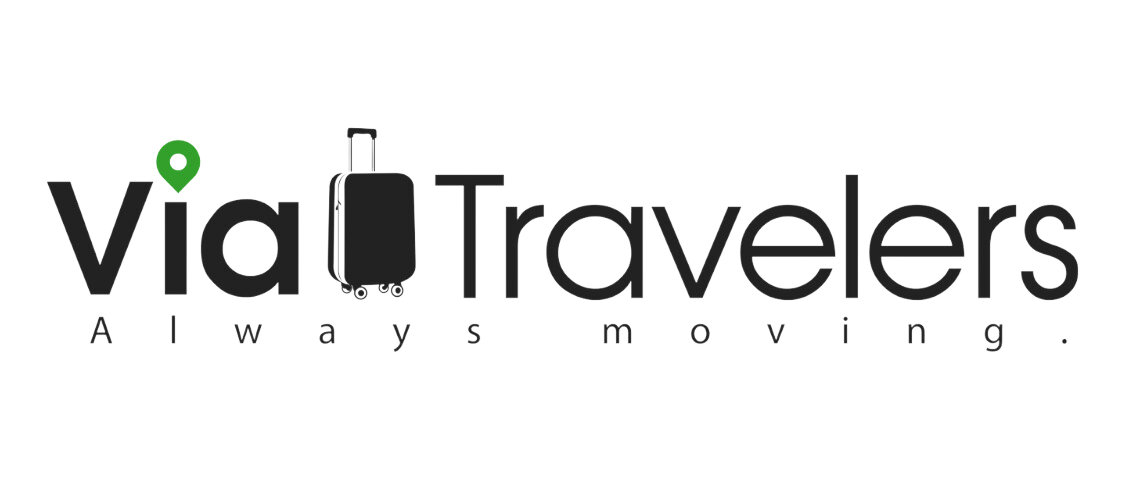
12 Proven Ways to Save Money for Travel

We take pride in providing authentic travel recommendations based on our own experiences such as unique images and perspectives. We may earn a commission when you purchase a product or book a reservation. Learn more ›
Written by Kyle Kroeger
Saving money is a challenge for most people. With inflation making the price of everything much more expensive than it used to be, everyone’s savings account has taken a hit in the last few years.
It’s not easy to save enough money for your dream vacation, but it’s not impossible , either. If you’re serious about traveling more, there are a lot of ways you can save money for travel that don’t involve earning extra income (though that helps).

We’ve got some of the best ways to start saving money for your travels plus a few tips to help you save money on your actual vacation.
Because once you’ve done the work of saving, you want to make sure you’re getting the best deals and stretching your vacation fund as far as it can go.
Here are some of our favorite ways to save money for travel and make your next trip one you’ll remember forever:
Want to Travel the World for Less?
- Going (Formerly Scott's Cheap Flights): Get cheap flights emailed directly to your inbox. Get 20% off a premium membership by using the promo code VIA20 Try Now for Free
- GetYourGuide: See more of every city by taking local tours and experiences. Find a Cheap Tour
- Skyscanner: Home to the easiest and most efficient way to book anything, including flights, cars, hotels and more. Search Now
- SafetyWing: Need to protect yourself and your trip? Use SafetyWing for affordable travel insurance and travel medical insurance. Protect Your Trip
How to Save Money for Travel
Let’s get into a step-by-step guide on how to save money for your big trip.
1. Know Your Numbers

First things first: crunch some numbers. How much money (after taxes) do you bring home every month? What about after the bills and other essential expenses are paid, how much is left over? How much of your savings account (if any) are you willing to allocate to your travel fund?
Regardless of whether you’re on a fixed income or your income changes from month to month, you’ll need to know what you’re working with before you start saving money for travel.
Factor in all of your bills into your overall monthly expenses. This includes utility bills, rent, and any other essential expenses like groceries, fuel, car notes, and insurance. Don’t forget to add in monthly subscription services like cable TV, Netflix, Hulu, or Spotify…you’d be surprised at how quickly those add up.
This is going to give you an idea of the potential savings. Of course, this isn’t a realistic number because life happens. Unexpected purchases are going to happen, we’re just looking for an estimate to see the potential.
2. Set Realistic Goals

Let’s set ourselves up for success, shall we? Saving $2,500 in 6 weeks to make it to Paris for Christmas may just not be in the cards. Trust me, I wish we could all buy a round-trip ticket to somewhere incredible at a moment’s notice, but realistically, that’s not the reality for many of us.
So often we give ourselves unrealistic goals and then beat ourselves up when we don’t reach them.
Get yourself a rough estimate of how much it’s going to cost to get you to your dream destination. And now, using the numbers you crunched earlier, how long do you think it would take you to save up enough money?
If your answer just took the wind out of your sail, don’t worry, we here at ViaTravelers have got your back.
This is a marathon, not a sprint. Remember, this should be a long-term type of goal. Most of us simply can’t save that much in such a short amount of time, even if we skipped every impulse buy, took public transit, and cooked every meal at home.
Be realistic with yourself and your financial situation, while still pushing yourself to meet your savings goals and growing your savings account is possible. I promise.
Check-in with yourself on a weekly basis to make sure you’re on the right track and monitor how much you spend. And don’t beat yourself up if you bought that coffee or enjoyed yourself on a night out with friends. This isn’t a punishment!
See Related: Incredible Bucket List Ideas of a Lifetime
3. Budget Ruthlessly

Now that we know our numbers and have set some realistic goals, it’s time to start slashing away at some unnecessary expenses. This is one of the best ways to reach your savings goal, but it can be a bit of a lifestyle change, depending on how intense you want to get.
Where can you cut costs in your life? Do you really need a monthly subscription for all of those streaming services? How often are you eating out, or having food delivered? If you’re a coffee drinker, I think we both know where we could see some huge savings.
You’re going to have to create a budget and stick to it, there’s no way around it. Now, I’m not telling you to stop doing things that bring joy to your life. I’m simply suggesting that maybe reel it in a little bit, or at least have a game plan.
Right off the bat, you could see huge savings by not eating out as much, limiting your drive-thru coffees, and maybe dialing back your nightlife a bit. These are all phantom expenses that we don’t think about at the moment, but they add up quickly to extra money in your checking account.
Start making a grocery list before you go to the store, and start meal prepping. Look for deals at the grocery, and stick to your list! This will prevent any impulse buys and unnecessary purchases.
Put a pause on those late-night Amazon shopping sprees for new clothes, limit yourself to one specialty coffee or cocktail a week, and watch how fast a few bucks here and there start adding up.
These changes don’t need to be drastic measures that completely change your life. They’re meant to make you more mindful about your daily expenses and everyday purchases so you can reach your savings goal and grow your bank account.
4. Start tracking your spending

Seeing exactly where you are spending money can be a game changer, especially if you’re a visual learner.
It’s critical to track your spending to determine where you may reduce or even eliminate it. With free personal finance tracking software such as Personal Capital , you can track your expenses.
When you track your spending habits and expenses, you can get smarter about where you can spend less and what monthly expenses are essential.
These days, your bank account online may even do it for you! I know I can check my Chase checking account online and it filters everything into nice little buckets so I can see exactly where my money is going.
If you don’t want to use software, that’s totally fine. There’s nothing wrong with tracking your spending old-school style with a pen and paper. This budget planner is less than $10 bucks and is easy to carry around with you.
5. Make extra money on the side

If you’re on a fixed income and are having trouble saving money for your travel fund, then finding ways to make some extra money can help you save money for travel much faster.
You could look into getting a side job, but there are many ways to get some extra cash into your account that don’t involve getting a side job.
Sometimes, finding ways to earn extra money can be as simple as having a yard sale or selling stuff in your house you no longer need. Other times, you may find that you can make some extra cash from some of your hobbies, like photography or traveling.
There are also many ways to make money while you travel . You can sell your photography and videography from drone footage on stock photo sites such as Shutterstock . Alternatively, you can write about your travel experiences by starting a blog .
While these may not be the cash cow you were banking on, every little bit helps grow that bank account!
See Related: Best Travel Jobs to Make Money Traveling
6. Create a Vision Board

Vision boards have been used by some of the most successful people on the planet, so don’t knock this one until you’ve tried it. They’re wonderful, tangible reminders of your goals, and you’ll be surprised at how effective they are.
As a visual person, I need to see my goals to help achieve them. While planning for my last trip, I made a list of my top three travel destinations and researched the approximate cost of it.
I then printed out a world map and colored it in those countries. I also put the dollar amount of the cost of the trip in bold red letters over each country. I then hung it up in my office, where I knew I would see it several times daily.
I found that this helped motivate me to save more money for travel and influenced my spending decisions throughout the day in a positive way.
7. Start A Vacation Savings Fund

From Kristy Marshall of MoneyBliss
In our household, traveling is a priority. It is something we enjoy, and we want to explore as much as possible. We set aside the same amount of money each month into our vacation fund.
My first money-saving tip on travel surprises most people when I tell them. This tip applies to bigger trips like all-inclusive vacations, Disney, Hawaii , or many international destinations.
Find a travel agent you trust and vet their price versus what you can get online. From our experience, we have gotten a better deal from our travel agent and have not spent hours scouring for the best prices. Plus, we can start our vacation sooner without all the vacation planning stress!!
For local travel within the US and quick getaways, I prefer to subscribe to a few travel deal newsletters like Going.com and Dollar Flight Club . This is a great way to explore a new place without paying full price. And you can get some screaming deals!
Lastly, we prefer the low-cost airline to save on air travel . However, the flight times are either super early in the morning or late at night. Since our airport is a hassle and expensive to park, we pay for a driver to and from the airport.
We pay less than getting preferred travel times and parking fees. For us, part of vacationing is enjoying the whole process. Save money where it makes sense, with little stress in planning, and enjoy the destination with quality time as a family .
Best Ways to Save Money While Travelling
Once you’ve reached your savings goal, now what? Well, it’s time to start planning your next big trip!
But you worked hard to save that money, so it’s important that you stretch those dollars as far as you can. If you’re willing to put in the time and do a little research, I guarantee you’ll end up saving money on your trip.
These travel tips will help you get the best deals so your hard-earned cash will go as far as possible.
7. Be Flexible

Flexibility is the best way to save money traveling, both when you’re booking and while you’re traveling.
Starting with the plane ticket, I’d recommend you check the flights a few days before/after the date you’re looking to go. You may find it significantly cheaper to fly out two days before you were planning, and these savings could be big!
That’s more money you can add to your travel budget and possibly use for a nicer hotel, a tour, or even a fancy restaurant.
Using travel companies like Skyscanner or Google Flights is perfect for this. All you need to do is put in your departure airport and it will tell you all of the cheapest destinations you can fly to within the next few months.
If you really want to get serious about traveling, sign up for a membership with going.com . These guys scour the internet for the best deals and send them straight to your inbox every day. There is a free version, but as someone who has been a premium member for about three years now, I can confirm the membership is worth it.
Another useful tip in the flexibility department is to check other airports. This is an especially useful tip when traveling to Europe , as it may be significantly cheaper to fly into one airport than another.
For example, last winter I found a cheap flight to Helsinki (thanks, Going !) but really wanted to explore Norway. I’m a fan of the journey rather than the destination, so I decided to take a ferry from Helsinki to Stockholm and then hop on a train up to northern Norway . Had I taken a direct flight, it would have been thousands and put a serious dent in my savings account.
Public transit, especially in Europe, is a fabulous way to travel long distances on a budget. Heck, public transit is also great for getting around big cities! And much cheaper than a cab.
It’s all a balancing act of what you’re willing to spend time on, and what you’re willing to spend money on.
See Related: Countries With Digital Nomad Visas
8. Start Travel Hacking

From Kevin Payne of Family Money Adventure
Travel hacking can be overwhelming if you’re starting, but it’s not that hard to figure out. One way to make it easier is to have a destination in mind before you start planning how to earn points and miles to pay for your trip.
Knowing where you’re going will help you pinpoint the best credit cards to sign up for and how many points/miles you’ll need to cover trip expenses.
You can also focus on getting part of your trip paid for with points, like your airfare. As a family of six, it takes a ton of points and miles to pay for an entire family trip, so often, we try to focus on earning enough miles to cover airfare first and go from there.
9. Make Airline Miles A Priority

With family in both Europe and America, we travel internationally often, so we mostly maximize travel savings by earning airline miles to pay for flights. Getting your round-trip ticket covered with miles saves us thousands of dollars on every trip we take, making it easier to spend money on food and activities during our trips.
Our favorite program is Chase Ultimate Rewards because we can transfer points to Air France / Flying Blue for affordable flights to Europe or use points for flights to the Caribbean or Mexico on Southwest.
We use a combination of cards – Chase Sapphire Reserve , Chase Freedom Flex, and Chase Freedom Unlimited – to earn as many points as possible over the year. We also use Chase Ink Preferred and Chase Ink Unlimited for all our business expenses, which helps us rack up points even faster.
I know it’s starting to sound like this article was sponsored by Chase (it’s not) but they really do have some of the best travel rewards on the market . If you don’t already have a Chase account and you’re serious about travel, it’s 100 percent worth looking into!
10. Diversify Your Types of Travel Credit Cards

My favorite way to save for travel is to combine different types of credit card rewards. Utilizing different travel rewards platforms allows you to mix and match and save yourself a lot of money.
For example, my wife is a Delta Platinum cardholder, so we will use her points to book some of our family’s flights and my points through a reward platform (such as Citi or Chase) to book the rest.
Or we will use my Southwest points to book flights and use a reward platform to book hotels (like we did for our trip to Hawaii last year). It can feel intimidating to open a new credit card that will give you points on an unfamiliar platform. Still, we’ve always benefited by having points in different places and combining them to save on travel.
See Related: Best Travel Credit Cards with No Annual Fee
11. Use The Best Booking Sites

From Daniella Flores of Hiking and Roadtrips
I love using apps like Southwest, Expedia , and VRBO to save money on travel when I don’t have many points to use. Southwest is best for domestic flights, Expedia for rental cars , and Airbnb for accommodation.
Bonus points if you use Airbnb referral credit for your booking (start sending that link to friends and family!) I give my referral credit to my friends and family for Airbnb, so if I know I have credits to use, I will first book for accommodation because I can get some free nights.
If not, I look through the cheapest accommodations (but with a good location close to shops and essentials) on Booking.com and VRBO.com, look for good rates for longer stays, and always pay with a rewards card so I earn points for future travel .
I use rewards credit cards for everything in our life, so we are always earning points. If Airbnb or VRBO has no good options, I’ll see if I have any Chase points or Hilton points from past stays to see if I can get a good deal that way.
Then if all of those fall short, I always turn to Expedia because I’ve used them for so long and have had a good experience. The thing with Expedia , though is you won’t always get the best view or room…that’s why they are always a bit cheaper.
See Related: Best Websites for Cheap Flights and Hotels
12. Cheap Flights May Not Mean The Best Deal

From Riley Adams of Young and the Invested
If you’re planning a holiday , it can be tempting to go for the cheapest available flights and accommodation. However, this may not always end up being the best choice!
The travel industry knows travelers looking for cheap deals and will often increase prices accordingly. If you want to get the most bang for your buck when traveling on a budget, then follow these tips:
- Be flexible with your travel schedule; don’t leave booking too early or too late in advance.
- Choose to visit during the off-peak season (January/February) or low season (April/October).
By electing to travel during an off-peak time of year, you can save yourself significant money. My wife and I recently chose to travel to Yosemite National Park in time for the final week of off-season travel. We saved over $400 on our 3-day hotel stay due to open bookings available and low competition.
12. Consider Van Life

From Lauren Keys of Trip Of a Lifestyle
Our favorite way of traveling is by taking road trips in our van. In 2019, we decided to visit every National Park in the US, which would take us from Florida to Alaska and back (along with a few flights to further-flung parks like those in Hawaii , American Samoa, and the Virgin Islands).
When planning our trip, we were trying to find a way to spend 6-8 months on the road without having a nightly lodging cost (hotels, campsites, etc.), so the idea of van life became pretty attractive. We opted for a very small van with excellent gas mileage, given how much we’d be driving.
Our van was bought used, we did very little to it in the way of converting it (literally just a bed on top of storage space in the cargo area), and we mostly slept for free by parking in National Forests, at travel centers, and at places like Walmart.
It worked out surprisingly well, and we actually kept the van even after that National Parks trip as our main method of travel (it’s also our only vehicle, so sometimes we get funny looks loading groceries on top of a bed).
When we do need hotels, we always head straight to Hotels.com . While the pricing among all those comparison sites is the same (the same 2-3 companies mostly own them), Hotels.com has a rewards program gets you 10% off (stay 10 nights, get the next one free).
We’re also big fans of using travel credit cards , but not to get a ton of travel points. Instead of signing up for specific hotel or airline brand cards, we stick with cards with a huge signup bonus, take it as cash, invest that money, and then pay more efficiently for travel expenses as needed.
Airline points could have never been redeemed for our van.
12. Negotiate

From Andrew Shrage of MoneyCrashers
Our guide to saving money on travel reminds travelers that everything is negotiable. Yes, including hotel and car rental rates. Book directly with the vendor rather than a third-party booking site (online travel agency or OTA), and you could realize significant savings if you’re willing to ask for a lower price.
You can save more on hotel bookings because the daily rate will increase. Hotels that pay 15% or 20% commissions to Expedia or Hotels.com are often willing to return part or all of that commission to you via lower room rates. Even 10% off the final bill adds up quickly — that’s $50 off a $500 stay or $100 off a $1,000 stay.
How do people afford to travel regularly?
By budgeting and planning, anyone can make travel a regular part of their life. It’s important to prioritize travel as a goal and adjust your spending habits accordingly. Additionally, taking advantage of travel rewards programs and finding affordable accommodations can help make travel more affordable.
What is the best way to save money while traveling?
The best way to save money while traveling is to plan and budget ahead of time. This can include researching affordable accommodations, finding free or low-cost activities, and using public transportation instead of taxis or rental cars. Using travel rewards credit cards or loyalty programs can also help travelers save money on flights, hotels, and other travel expenses.
What is the best way to avoid overspending on vacation?
To save money on vacation, consider traveling during off-peak times, using reward points or miles for flights and accommodations, and choosing affordable destinations or accommodations. Additionally, try to minimize unnecessary expenses like dining out for every meal or buying souvenirs.
Related Reviews
- Dollar Flight Club Review
- Going (Formerly Scott’s Cheap Flights) Review
- Thrifty Travel Premium Review
- SeatGuru Review
- Dollar Flight Club vs. Going.com
Related Resources
- Best Travel Insurance for South America
- Friend Vacation Ideas
- How to Travel Sustainably
- Best Sites for Booking Tours
Please sign in to leave a comment.

Free Travel Budget Calculator: Easily Make Your Vacation Budget
Packed for Life contains affiliate links. If you make a purchase using one of these links, we may receive compensation at no extra cost to you. As an Amazon Associate, I earn from qualifying purchases. See my Disclosure policy for more info.
Ready to take the hassle out of planning and managing your vacation budget? Our online Free Travel Budget Calculator is simple, and easy to use, and can help you plan and track your vacation expenses in just a few clicks.
I’ve used these same methods and categories of expenses for every trip I’ve taken over the last 25 years. From multiple 3 month solo adventures through Europe and South America, to weeks long trips to Cuba and Vancouver Island, Canada with my family.
Now online with automatic calculations, so you don’t have to mess around with spreadsheets or hand write in printables that clutter up your home.
In this post you’ll get access to this free tool, plus, you’ll get my top tips for planning your budget effectively for your trips and how to save money on travel. All the advice you need for smarter travel planning is right here.
Table of Contents
How to Use the Travel Budget Calculator & Try It Out!

Make sure to bookmark this page so you can come back to it anytime you need to track your vacation expenses and make travel plans.
This free vacation budget calculator will give you an estimate of total travel costs for your trip and whether your budget is enough to cover what you want to do.
It can help you identify areas you can potentially save money on trip expenses. Whether it’s choosing more budget-friendly hotels, walking or taking the bus instead of taxis, or prioritizing your top not-to-miss activities.
You can also start with your budget.
Then play around with the length of your trip, how much hotels, flights etc will cost to help you determine your price range for each travel expense as well.
- Enter 0 (zero) if there are certain categories you don’t need . The calculator will output an error ($NaN) if you don’t.
- Instructions for the calculator are below the Travel Budget Calculator, to give you an idea of what you should include under each budget item.
Vacation Budget Calculator
Calculator instructions.
Enter all your estimated expenses you’ve gathered during your vacation research.
Make sure it’s actually a realistic travel budget. For a family trip with young kids, you’ll also need to factor other things like diapers, baby wipes etc.
- Travel Budget : Enter your overall vacation budget you have for this trip.
- Number of Travellers: Enter the number of people you are paying for on this trip
- Number of Nights: Enter the number of nights you will need accommodations for. This will be used to calculate hotel costs.
- Number of Vacation Days: Enter the number of days you will be on vacation. Include travel days to be safe . This will be used to calculate your overall food & drink, daily transportation and activity costs.
- Total Flight Costs: Enter the estimated total of flight costs for everyone travelling. Be sure to include any baggage fees.
- Transportation Costs: Enter the total transportation costs for the trip. This is for any major transport costs that aren’t flights like trains, city transfers, car or RV rentals.
- Daily Transportation Costs: Enter your anticipated daily transport costs. This is for things like taxis, buses, Ubers, parking costs etc, you might need to get around every day.
- Hotel Costs (Per Night): Enter the amount your accommodations will cost each night. Don’t forget to include any tips for housekeeping staff etc. you may need to pay.
- Total Tour Costs: Enter your overall total budget or cost for tours, including guide tips.
- Activity Costs (Per Day) : Enter the amount you expect to spend on activities daily (do not include tours). These are for things like seeing movies, souvenirs, shopping, trips to a rec centre / pool, bowling, seeing a hockey game or a concert etc.
- Food & Drink Costs (per Day): Enter your overall daily food & drink budget or expected costs for everyone. Don’t forget to include tips.
- Miscellaneous Expenses: Enter an amount of money you will have overall for unexpected expenses or miscellaneous costs that pop up. Be sure to also include extra travel expenses not covered elsewhere.
- Travel Insurance: Enter the overall amount of money you will pay for travel insurance for everyone. This is for things like travel health insurance, trip cancellation insurance etc.
Budget Outputs
Currency Note: While the output is in dollars (uses the $ symbol), you can really use any numerical currency you’d like. Just ignore the $ symbol.
Once you hit the calculate button, you will get 4 pieces of info based on the numbers you provided:
- Total Vacation Costs : This is the estimated cost for your vacation based on the info you provided.
- Over Budget / Under Budget: This is the amount you are either over or under budget. If your expenses are over your vacation budget, it will say Over Budget and the number will be negative. If it says Under Budget, that is the amount you are under your estimated budget.
- Travel Costs Per Day: This is the amount of money your trip will cost you each day.
- Cost Per Person Per Day: This is the amount of money your trip will cost you per person, each day.
Make sure to review your results. If your over budget are there things you can do to bring the costs down? Or is there a way you can save or make more money before your trip?
Why You Need A Travel Budget

Listen, I am all for spending a little extra to do things our family doesn’t get to do at home.
But there is nothing more anxiety-inducing than running out of money on a trip, or having to pay off huge credit card bills at 28% interest because you didn’t plan ahead.
This is where a vacation budget can really help.
It doesn’t mean you can’t have fun or spend money.
Creating a budget will actually help you be able to afford your dreams. Plus be able to relax & have fun on your vacation knowing you won’t be in debt when you get back home.
The trip budget calculator will make financial planning fun, and easy.
How To Set Your Travel Budget & Determine Expenses
1. determine your overall travel budget.
First things first. Decide on your overall vacation budget or the money you are willing to spend on this trip.
When determining your overall vacation budget, you’ll want to consider a few things:
- How much money are you willing to spend on this trip?
- How much have you already saved?
- How long do you plan to go for? (more or less time can impact your budget)
- How many people will be travelling? (some places like Europe limit 4 people to a hotel room, this can significantly impact cost)
- When do you want to travel and how much time do you have to add to your vacation fund?
- How much extra can you afford to put away every week / month on top of your regular bills & household expenses?
- Is there any way you can decrease household expenses, or increase your income to add to your vacation fund faster?
Just make sure it’s a realistic budget. It doesn’t do anybody any good to use too low or too high numbers as a starting point.
2. Do Your Research
The type of trip you want to take, the length and the type of activities you want to do, will really impact your budget.
For example a week long trip to Thailand will be much different than a week in Japan, or a trip to Disneyworld.
Do some intial research to give you an idea of what your basic travel expenses will costs, so you can have ballpark figures to enter in the travel cost calculator.
You can always google average costs of living / travelling at your destination.
Careful planning is an important part of any travel budget.
3. Find Ways to Cut Costs
Unless you have a rich benefactor, or suddenly won the lottery, it’s a good idea to consider ways you can cut costs, save money and use your travel budget wisely.
Besides using our holiday budget calculator, our favourite ways to save money on travel expenses.
Transportation & Accommodation
- Find flight deals & error fares : The best way is with Going (Formerly Scott’s Cheap Flights) Flight tickets can be a big expense and make up a good portion of the total cost usually.
- Consider housesitting: is our go-to site for housesitting around the world.
- Rent a place with a kitchen : Save money on food with a vacation rental . They can also be cheaper than renting multiple hotel rooms if you have a large family or group.
- Compare car rentals: Using Discover Cars can help you save up to 70% by quickly comparing rental cars options.
- Book early: Hotels, flights and trains are generally cheaper booked in advance. You won’t want to risk paying significantly more waiting until last minute.
- Take public transportation: If it’s safe to do so, take the local bus, or walk instead of relying on expensive taxis all the time.
⭐️ Also check out our list of the best ways to save money on flights .
General Money Saving Tips
- Travel off season or peak season: Not only is it usually much cheaper, there’s usually fewer tourists.
- Use a credit card with no foreign transaction fees : Those transaction fees can really add up. Also consider if travel credit cards with points are for you.
- Eat where the locals eat : Avoiding the touristy restuarants, and eating where the locals eat will not only save you lots of money, it will give you a more authentic look into their local cuisine and culture.
- Avoid popular destinations: The most popular touristy destinations often cost a lot of money, compared to smaller, lesser known destinations.
- Consider using travel agents: Sometimes a travel agent can find you a great deal, with much less work on your part.
- Adjust your travel style: Luxury resorts may be out of your price range. Road trips, camping trips can be just as memorable for for a family vacation.
- Plan free activities : Pick some free activities to do in between your more expensive tours, theme parks, & day trips to ancient ruins.
- Check out these ways to save on flights

Final Thoughts Using The Vacation Budget Calendar
Creating a vacation budget might seem challenging, but don’t worry! Equipped with the right tools and a bit of strategic planning, your next epic adventure is closer than you think.
Using a vacation budget calculator can help guide you to make smart, affordable choices, allowing you to experience the journey you’ve always dreamed of, without stressing about expenses.
Travel can be exciting and enjoyable at all budget levels. So here’s to making memories with your family, and friends.
Related travel planning resources:
- Ultimate Pre-Travel Checklist
- Family beach vacation tips
- Tips for saving money on road trips
- Easy ways to build a travel fund
- Save money on attractions: Where to buy online tour tickets
Donna Garrison is the founder of Packed for Life, an ever curious traveler with a passion for making memories with her family. With a unique perspective on travelling on a budget gathered over 30 years, 20 countries and 5 continents she gives families the tools & resources they need to experience the joys of travelling more for less through practical solutions. She helps over 20,000 families a month plan & take the family travel, camping and road trip adventures of their dreams in Canada, the USA and around the world. Contact her at: Donna [at] packedforlife.com
Similar Posts

50+ Easy, Healthy Road Trip Snack Recipes: Road Trip Foods
Planning a road trip? It’s important to keep up your…

75+ Easy Road Trip Snacks To Pack, Grab & Go
Road trips are fantastic adventures to take with friends, family…

11+ Best Places To Visit In Winter In USA for 2024
Looking for fun winter vacations with snow in the USA?…

Is A Family Vacation An Excused Absence From School (2024)?
Many families in the United States and Canada choose to…

How Often Should You Take A Family Vacation?
A family vacation may be something that people think of…

2024 Ultimate Family Road Trip Packing List (+Free Printable Checklists)
Planning a family road trip can be exciting but also…
Privacy Overview
- Work With Us
36 Real Ways to Save Money While Traveling (Actionable Tips)
Written by Becca
Updated on July 31st, 2024
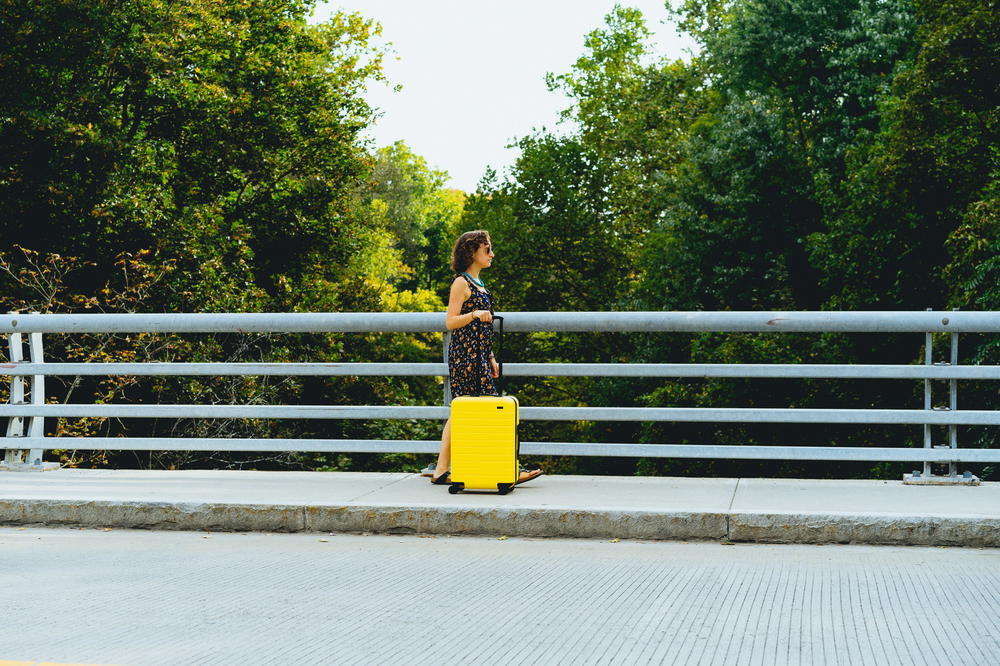
Here are our proven best ways to save money while traveling. When traveling on a budget, there are lots of ways to make your money last longer, even during inflation.
This article may contain affiliate links. We earn a small commissions when you purchase via those links — and it's free for you. It's only us (Becca & Dan) working on this website, so we value your support! Read our privacy policy and learn more about us .
Table of contents
- Travel in the off-season (aka never around Christmas)
- Find things to do for free when you travel
- Walk and take public transit when you travel
- Minimize attractions with entrance fees or cover charges
- Minimize buying drinks at bars
- Avoid losing all your money with an emergency stash
- Cook more and eat out less
- Cook with fun local (and cheap) ingredients from markets
- Compare the flight costs in low season
- Save money by staying in hostels
- Try house-sitting to save money on accommodations
- Save money by booking accommodation for longer to get discounts
- Travel in places where your home currency takes you farther
- Travel on less than $50 per day
- Track your spending with an app
- Use Splitwise to keep track of splitting bills with friends
- Avoid the most expensive places to travel (or know the reality)
- Research the price of travel and the trends
- Cut out shopping and take photos instead
- Get connected to some locals
- Drink the tap water (if it’s safe)
- Buy local brands and locally-grown produce as snacks
- Do your research in order to save money and avoid fines
- Listen to travel and finance podcasts!
- Use a credit card to get a good foreign exchange rate
- Sign up for credit card a bonus to pay for your trip on miles
- Don’t pay foreign transaction or ATM withdrawal fees, ever
- Shop around for trip insurance online
- Get Priority Pass to save on airport lounges, and get in for free
- Find the best price for flights
- Save money with rental cars
Save money by using ride-share-style cabs
- Travel in a group and share download links for free credit
- Shop around for the best hotel, Airbnb and hostel prices
- Take out a weekly budget in cash
- Find creative and new ways to work remotely and travel
When traveling, you may want to save as much money as possible so that you can extend your trip. The less money that you spend means that you have more money to spend on experiences, accommodations and everything else.
It’s easy to not think twice about expensive upgrades and eating at restaurants every meal. At home, you’re in control and you know your budget. When traveling, you may have different currency and don’t want to skimp!
So, how can you still have a great time on your trip while optimizing for a budget?
Let’s find out!
Travel in the off-season (aka never around Christmas)
Have you heard the term ‘high season’? It’s a real thing!
Some places become more expensive during Christmas and New Year’s, during summer (relative to the hemisphere!) and during spring breaks (depends on local university schedules).
If you avoid these times of year, you’ll find hotels that want to fill up their properties, tours that may discount prices in order to draw visitors in the off-season and lower flight prices.
Depending on where you are going, do your search to determine when high season is and try to avoid it.
Find things to do for free when you travel
All over the world, it is possible to find things to do for free. It’s a great way to beat inflation or rising costs, and enjoy activities that cost nothing.
If you’re not interested in walking for miles to see a city and its parks or buildings, you can seek out ways to enjoy nature and the arts, like for example with this list of free things to do in NYC .
In Rotterdam , which is a fairly expensive place to travel in terms of the cost of accommodation and food, we appreciated famous architecture for two days, all without paying a Euro! We took ourselves on a self-guided walking tour and snapped photos of the Cube Houses and the train station that looks like a spaceship.

In Tenerife, we hiked Teide National Park for free on its trails that are available when you get off the public bus. The visitors center is free as well. We avoided the tourist-heavy gondola ride up the mountain, and we somehow didn’t pay any fees aside from the public bus ride.
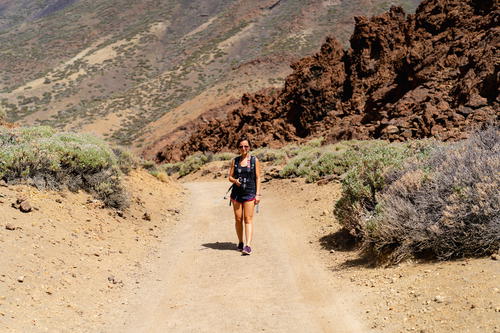
In Ireland, we entered natural and historic sites like Glendalough for 0 EUR, and enjoyed priceless views and the feeling of being in ancient medieval ruins.
On a road trip in Upstate NY, we got the coolest scenic views of the Hudson River on a beautiful (and unexpected) hiking trail at Olana State Historic Site , all for free.
All these cool things we did cost us nothing and were just as memorable as lots of things we’ve done that cost us entrance fees.
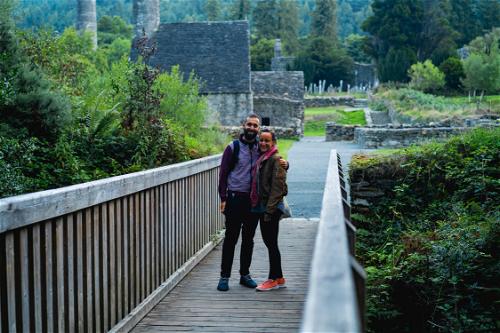
Walk and take public transit when you travel
We love walking, and we also focus on our daily step count. As our friends Alex and Ryan would say, “Keep moving!”
If it comes down to having some time in which we can walk rather than taking a taxi, we’ll do that! If we can’t walk, meaning if distances are too big, we first consider mass transit. Mass transit is more environmentally-friendly and usually saves money (especially if traveling solo).
In Europe, the train and bus systems are very impressive and efficient most of the time, and in Amsterdam , we immediately looked for the public train that would take us from Schipol Airport to the city center.
From there, we used Google Maps to find the correct tram to the Lloyd Hotel and the ticket-taker advised us to buy a multi-day tram pass that wound up being very efficient for our purposes in Amsterdam.
Overall, walking and figuring out the bus, subway or train routes helps us to avoid hefty prices on taxi travel.

Minimize attractions with entrance fees or cover charges
All over the world, there are attractions that cost money. During times of inflation, these types of charges will increase .
In no way am I telling you not to go to incredible wonders of the world like the Sagrada Familia in Barcelona or the Forbidden City in Beijing (both of which require paid tickets acquired beforehand for entrance), but it’s important to realize that most of enjoying a place does not require spending heaps of money.

For our days spent in Barcelona, Spain , when we did not go to the Sagrada Familia or Parque Guell (also requires a ticket purchased in advance), we walked six or seven miles, getting to know the city, its neighborhoods, its many parks and cafes.
This kind of enjoyment is free (or costs very little, depending on what you eat or drink).
When I went to Singapore in 2012, I saved money by staying with a friend, but blew my budget by taking a $40 taxi one night by myself and going to Singapore’s most famous bars and clubs, which charged cover fees of $25/person, each night of the weekend. This accounted for a chunk of my daily travel spend and gave me a bit of stress!
Conversely, we went on a day trip to the Mexican village of Izamal , where all attractions were free and we spent an entire afternoon packed with sights, without spending anything.
Minimize buying drinks at bars
If the cost of food wasn’t enough when traveling long term, the cost of alcohol has to be added on top.
If you consider that in some of the world, beer costs $0.25 (Vietnam), but in some places, $10 (San Francisco, CA), there are some very varied costs in consuming alcohol in different parts of the world.
No matter where you go, alcohol is not something required for your body. Although some people travel for beer, or travel for cocktails or wine, or consider alcohol as a way to explore a place, if you consume alcohol every day, it can become a hefty portion of your daily travel costs.
There are ways to avoid paying per-drink at bars, however - if you’re staying at a hostel and there’s a common space, backyard or rooftop, you can bring back a six-pack or bottle of wine (if rules allow it).
We did this at our hotel in Montauk, NY , where sitting around the fire pit with a can of hard seltzer was just as relaxing as it would have been in a bar in the downtown.
In some countries, drinking in parks is allowed (Spain has this type of culture, for example), and you can purchase your wine or beer at a corner store or supermarket and enjoy it in the outdoors.

Avoid losing all your money with an emergency stash
This is for of a safety trick, but it goes for saving money as well because you’ll save money if you are smart with it.
Best tip is to avoid travel with a lot of cash, but do keep an emergency stash just in case of emergencies.
Be sure to break it into smaller stashes and spread them around your gear in places people won’t think to look, like places that are not visible. Don’t ever let anyone see you handling your cash stash (or where you stash an emergency credit card (i.e. don’t keep all your credit and debit cards together).
Lastly, write down where you stash your cash so you don’t forget (write it in a place that only you can access!)
Especially when walking around places where petty theft is common (Spain, Colombia and Vietnam, to name a few) we choose to leave most credit cards and most cash in our apartment or hostel, and only leave for the day or evening with what we need.
This means having one debit card, one credit card and a non-excessive amount of cash in our wallets at any given time.
Our emergency and alternate credit cards are kept in secret places (it’s true!) in our luggage so that someone who may enter the room where we’re staying won’t find them quickly.
Cook more and eat out less
There, we said it: stop eating in restaurants (all the time!).
If you travel for longer than a three or four-day getaway, you notice how eating in restaurants adds up very quickly.
There’s tax, tip (most places), the drink from the ‘Drinks’ section that looks good, the add-in of an appetizer or a side (or three) and a little bit of dessert.
Unless you’re in Sri Lanka , where eating out for two runs you 6 USD (all following prices are listed in USD) or so (with tea and smoothies), chances are that eating out in most of the world is more expensive than cooking your own food.
Plus, cooking more and eating out less (or skipping the full sit-down meals and opting for fast casual) is a great way to save money during periods of inflation.
Cook with fun local (and cheap) ingredients from markets
For this reason, when traveling long-term, Dan and I choose to cook with fun local ingredients we find in markets and in supermarkets.
In fact, one of the first things we do when we get to a new city is to locate the nearest supermarket, and ‘star’ it in our Google Maps.
In Peru , we cooked with Peruvian chili peppers, in Colombia we cooked with arepas and in Mexico , we made everything into a taco (a package of 10-12 corn tortillas is about $1 at most corner stores).
If you’re traveling full-time or for an extended period of time, it’s a great idea to learn to cook some easy dishes, because eating out can get old, fast.

Compare the flight costs in low season
As a quick example, Dan and I compared the cost of flying from Mexico City to New York on January 1 and on January 15.
On January 1, a one-way from MEX to NYC is $577, and on January 15, the price goes down to $164, one-way. To save $413, you can schedule your trip two weeks later (when schedules permit).
An interesting way to think about this is, Will the cost of staying another X days in the city will outweigh the costs of a more expensive flight, sooner?
To date, I’ve also taken two trips to Colombia in February, which is a rarer time of year to travel, relatively-speaking. My flights were rarely more than $350, round-trip.
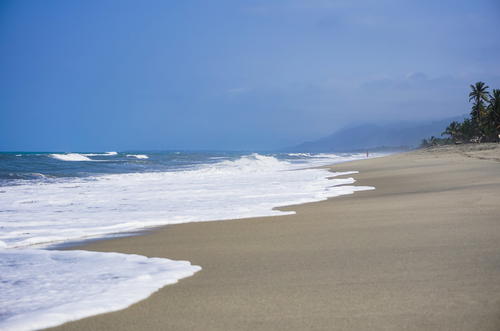
Save money by staying in hostels
Why should you stay in hostels ?
First, it’s appropriate to point out that hostels aren’t ‘always cheap.’
In fact, in the Netherlands and on Ireland’s Wild Atlantic Way , we chose to stay in Airbnbs because hostel privates cost upwards of $100 per night.
Hostels are a memorable experience
For the most part, Dan and I have traveled in many parts of the world and have stayed in awesome hostels that have been both affordable and memorable.
Why do we love hostels?
Hostels are a place to make connections, to meet people, to have access to helpful staff, to take part in group outings and to learn.
Hostels provide cultural & social experiences to remember
In Israel, Abraham Hostel Jerusalem had us take part in a hummus-making class, and in a hostel in Salento, we met our hiking buddies for the following day at a campfire on our very first night.
Even if you would like some privacy and quiet by booking a private room, you can still socialize and meet other travelers in hostel common areas like lobby areas or hostel bars, patios, kitchens and rooftops.
We have both made lifelong friends from all around the world by traveling on our own (and together) when in hostels.
Plus, you may wind up with a travel buddy for a hike or side trip the next day - who knows!
Hostels are good for our budgets
For the most part, hostels have been a cost-effective way for us to travel for months on end. In Sri Lanka , we stayed in hostel privates for $40 per night, and in Guatape, Colombia , that figure was sometimes as low as $15 for the two of us.
In places like Andean South America, Central America, South and Southeast Asia, you can sometimes get a hostel dorm bed for as little as $5 to $10 USD per night. You can also find hotel rooms for as little as $16 USD on sites like Booking.com , like we did in Vietnam.

Try house-sitting to save money on accommodations
House-sitting is another great idea, and we’ve read about people who make their entire livelihoods traveling the world as house-sitters. It’s a great way to essentially get paid to travel , if you think about it like this.
Ryan and Alex recently told us that you can find free housing on TrustedHouseSitters.com with a membership fee of approximately $100 for the year.
This is a great tip for looking into, if you’re flexible, open-minded and ready for a little bit of responsibility!
Save money by booking accommodation for longer to get discounts
For long-term travelers who use Airbnb to book accommodations, you can save a significant amount of money (anywhere from 10-50%) if you book for at least four weeks, as hosts will offer monthly discounts to avoid having new guest turnover every few days.
Similarly, for the risk-takers among us, look for new properties (those with the fewest reviews), as they’ll often come with the biggest discounts from folks in need getting reviews. They’ll often be incredible hosts, as they really want the five stars.
Even if you’re planning a few side trips from wherever you are, the savings can be significant enough that you don’t have to worry about leaving the room empty for a few days, AND you won’t have to find a new place upon your return!
Our Hanoi apartment (an Airbnb) was booked for four weeks, so we got a 12% discount. We treated it like an apartment we were paying rent on, rather than a place that costs us X amount per night.
Travel in places where your home currency takes you farther
A great hack for lowering the price of travel, saving money and maximizing your budget during times of inflation is to travel in low-cost countries.
There’s a very important website I like called Price of Travel and I’ve used it a lot to compare the cost of travel in various places. Sometimes this can be very plain and simple, but sometimes it’s not as clear.
Travel on less than $50 per day
Whenever we travel to Asia and Central and South America, we put a maximum of $50 per person per day. Dan and I travel together if it wasn’t clear!
We almost always out perform our target and sometimes even make it close to $50 per day for the both of us combined.
Keeping a target for yourself and your family is a great way to stay on track and not exceed your means.

Track your spending with an app
Apps like Mint and YNAB are staples in most households for keeping track of your day-to-day budget. When you travel, well, you can still use those apps!
If you put your expenses on a credit card, you can automatically file your expenses into the travel category. If you take out cash, you can manually enter in every line item, or put the lump sum in one line item.
Some credit card also come with a baseline categorization for transactions and may give you a monthly summary. That won’t help you for cash transactions, other cards and if you split an expense with someone.
Any time I travel, I’ll manually track everything in a Google sheet (MS Excel also works). After each trip, I reflect on my spending categories and determine the cost per day and if I overspent somewhere.
With this data, I can be better informed with how to plan another trip.
Use Splitwise to keep track of splitting bills with friends
Splitwise is an app that allows you to be part of a group and track shared expenses and amounts owed over however long you want. We used it at Nine Coliving had to track amounts we owed to other travelers for groceries, group dinners and other expenses.
What we like about the app is that you only owe the final difference, and you can keep the tally going for the duration of your stay somewhere or for the length of a trip with other people. It’s so useful for traveling with friends or with group trips .
Avoid the most expensive places to travel (or know the reality)
I’ve been to Singapore, which clocks in as one of the most expensive places to travel . My cost of travel in Singapore averaged closer to $100 per day, even with staying at an American friend’s apartment.
Dan traveled to Iceland and the cost per day was comparable.
In Singapore, street food meals cost close to $20, beers in a convenience store were $7, a taxi from the bar district to my friend’s apartment was $40 and other daily expenses like snacks, coffee and taking the metro added up fast.
For places that are inherently expensive, there might not be an off season to travel in. It might be expensive all year around.
Some baseline trips that we’ve mentioned throughout this article, like leveraging hostels, shared rooms or cooking at home might help you save money through these destinations.
Research the price of travel and the trends
Figuring out the average price of travel in world cities helps us determine what we’d like to do in order to travel longer and better.
Sometimes it’s committing to cook all of our meals or cutting out drinking in bars in order to compensate for costs like rental cars, taxis we’ll need to take or costs incurred in visiting the must-see attractions of a destination.
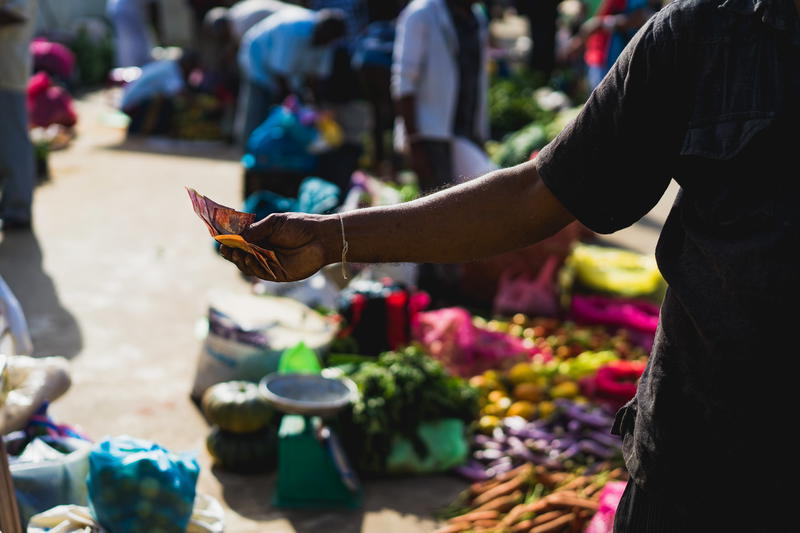
Cut out shopping and take photos instead
If you want to stop spending money when you travel, stop shopping. It’s a great hack during periods of rising costs and inflation, or at any time, as a smart choice for travel saving.
I used to buy something every time I traveled. I considered my souvenirs as a collection of the places I’d been. I used to buy a tank top for every Southeast Asian and Central American country in which I backpacked.
I grew out of this phase when I realized that the shirts would get old and stretched out or not fit anymore, but my photos were the basis for all my memories.
Is it worth collecting souvenirs?
The truth is, now I have these eight or so tank tops sitting in a box collecting dust. For the ones I like, I wear them as pajamas.
I would also buy things to take home to my family - shot glasses for my family members, local snacks (wrapped and non-perishable) for my mom and always a bag of coffee, from Guatemala or Costa Rica, for my dad.
If you’re someone who’s very into collecting souvenirs, go for it. But if you find joy in photos, or simply memories in your mind, skip the material objects that may collect dust one day in a closet.
How to stop buying stuff when you travel
So, I stopped buying things both for myself and for others. I consider that my photos say it all.
Instead of ‘investing’ in souvenirs for yourself and others, invest in a trusty travel camera that will help you remember your travels even when souvenirs get lost or broken.
Photos don’t weigh down your luggage, and they definitely don’t spoil, rot, collect dust or break (ok, maybe they can break if you don’t take good care of it). Above all, once you stop shopping, you’ll notice how much money you can save.
Check out our favorite budget cameras!

Get connected to some locals
Anywhere you go, locals know what’s up. If I have visitors in NYC, they’re thankful that I can take them to the non-touristy neighborhoods they never would have found otherwise, or take them for local activities like picnics with my friends, which cost tons less than a tour or an activity that costs a lot of money.

Dan and I love meeting locals and meeting up with local friends of friends when we travel.
In Buenos Aires , it was my friend Ayelen who took us on a double-date with her boyfriend to their favorite place for steak and wine. We sat on the street and commented that if not for them, we never would have found such a local experience.
When I started planning my trip to Nicaragua, my parents found out that a friend of theirs had a good friend who owned a coffee plantation in Esteli.
They put me in touch, and I wound up with an airport pickup from their driver and a private stay on a coffee plantation for my first night when I flew in by myself!
For anywhere you go, reach out to your network. You never know who you may find - an old friend from years back, a relative you’ve never met before or a friend of the family, who has a connection to the destination you’ll be traveling in.
Post on your social media channels about where you’re headed, and ask around and talk about your trip to determine if any friends or family members have connections there.
The most meaningful travel experiences are the ones that happen with other people!

Drink the tap water (if it’s safe)
It’s incredible to realize the difference between a trip on which you can drink the local tap water and one on which you can’t.
When you can’t safely drink the water, there’s so much more to think about, like running out of water, or how much water to buy or how much water can you physically carry back to where you’re staying.
In Europe and Israel you can safely drink the water that comes out of the tap, no matter what. After traveling in Asia and Central America for five years, this came as a pleasant type of culture shock to me!
I love water and staying hydrated, so water availability is a big factor in my travel.
Is it OK to boil tap water?
When living in Shanghai, I would boil the water that came out of my sink in order to make it drinkable.
In all honesty, this was a fine scenario because most of the winter months, my apartment was so cold that I wanted to warm up with hot water! I would add tea, lemon and ginger to make it taste better.
Some places are a pleasant oasis for drinkable water, namely Medellin and Bogota, Colombia, where you can safely drink tap water and it even tastes pretty okay. In these places, it’s smart to pack a reusable water bottle in your luggage in order to minimize plastic.

Buy local brands and locally-grown produce as snacks
What’s better than trying new foods? Nothing! We love trying the ‘local stuff’ when we travel, whether it’s local tamarind candy from Mexican drugstores (only $0.30!) or dried coconut sweets in Colombia (roughly the same price tag, at $0.31 for one!).
When I lived in Shanghai, I shopped local - Asian pears, chestnuts roasted on the street, eggs from the supermarket and of course, rice and tofu.
My friends who ‘required’ imported American goods from home at the expat grocery stores would fork over lots of money to have a taste of what they missed from home like specialty flavor M&Ms and American cereal (nearly $7.00 for a small box).
In Estonia, Dan and I asked the hostel owner of our hostel which types of foods were native to Estonia and therefore would make for affordable purchases in the supermarkets.
We found out that products like potatoes, dill, apples, pickles, carrots and beets were the in-season foods that we could buy in order to shop local and lessen our carbon footprint.
We ate pan-fried potatoes with dill countless numbers of times in the following weeks, with no regrets!
When you land in a new place, ask a local - your taxi driver, a local or any other connections you can make - for what’s locally-grown. You may be in for some great surprises.

Do your research in order to save money and avoid fines
This one’s funny, but true - if you are aware of the rules in a new place, you will save money by following them. Whether it’s about open-container laws or driving regulations on the highway, asking locals or researching online can pay off.
When Dan and I were in Argentina, we rented a car and started a road trip through the Cordoba Sierra region .
The company that rented us the car had warned us to always use the daytime lights, at all times. Seems easy, right?

We stopped the car along the highway to take some photos of the mountainous views, and when we got back into the car, we forgot to turn the daytime lights back on.
Within fifteen minutes, we got stopped at a toll plaza and were issued a ticket, which we tried to fight, but we were unsuccessful.
An hour later, while closer to our destination, we stopped the car again for a break. When we got back in, we forgot to turn on the daytime lights. Would you believe it? We somehow got stopped again and were issued a second ticket for the same offense by a police officer.
It pays to keep the rules in mind! We spent our final day in Cordoba running around the city looking for the office at which to pay the fines. You could say we learned a lot about the rules in Argentina for highway driving!
Listen to travel and finance podcasts!
Ok, this isn’t really a specific way to save money while traveling; however, it’s an excellent podcast and it talks about a lot of different ways that you can save money.
We listen to podcasts super often and it’s how we’ve gotten new ideas on how to optimize travel, budgeting and finance.
Use a credit card to get a good foreign exchange rate
Whenever we can, we use credit cards when we travel, in order to get the best foreign exchange rate of the day and to also build points and miles.
Lately, we’ve been using the United Explorer card . There is no foreign transaction fee and has some really nice benefits.
We typically like using credit as much as we can while we’re away. We’ve found that we get the best conversion rates and don’t need to take out too much cash if we’re using credit often.
Using credit when you travel also (for us) shows exactly where our money went. And, if for some reason your credit card number gets stolen while you’re traveling, a company like Chase will contact you by text and email and let you know that there was fraud so you can resolve it.
This is especially relevant when purchases made abroad on a credit card can come up as a little bit dodgy for credit card companies and the security checks they may run on your account to make sure your account number is safe.
Note that when referring to a travel credit card, there is a difference between this and an “airline voucher.” For more on airline vouchers, see our guide called “ What is an Airline Voucher ?”
While you’re shopping at home, a browser extension like Honey can help you save money on everyday things!
Sign up for credit card a bonus to pay for your trip on miles
Travel costs can really start to add up. You’ll start paying for flights, hotels, things that you need to pack and the list goes on.
Lots of credit cards have sign-up bonuses that you can leverage to get either cash back or points that you can redeem toward travel.
The famous Change Sapphire Reserve used to give you 100,000 points for signing up. That was worth about $1,500 that you could use toward travel.
In order to get the bonus, you needed to spend a certain amount, like $4,000 in three months. Note, though, that making large travel purchases in an optimal timeframe is a perfect way to hit spend minimums like this.
Our travel has changed so much since we learned the points and miles games through travel hacking . My first flights completely on miles with United was round-trip to South Africa. Even though the flight path was a bit crazy (New York - Frankfurt - Johannesburg - Cape Town), I got a built-in day to spend seeing Hamburg, Germany.
We save and earn miles on Jet Blue as well, and we book flights (sometimes big flights!) on our points with our credit card rewards. This has been really exciting for us in recent years!
Also, always remember to use any airline vouchers you may have gotten or earned on past or cancelled flights, to apply when purchasing.
Don’t pay foreign transaction or ATM withdrawal fees, ever
Whether you’re taking out cash or swiping your credit card, if you travel internationally, you may be paying for foreign transaction fees.
These fees are determined by your bank or the ATM itself and usually take something like 2 or 3% of the entire purchase.
That is expensive, and wasteful. It can also add up and put a damper on your travel budget.
Looking for a new travel credit card? Consider the United Explorer card . We have this card! We like it because of the sign-up mileage bonus, Global Entry credit and no annual fee for the first year.
Avoid paying fees when taking money out of ATMs abroad
When Dan introduced me to the Charles Schwab ATM card, I couldn’t believe it. I was so accustomed to getting charged $3-4 per ATM transactions on my trips to Guatemala, Peru, Ecuador and Bolivia that I didn’t think there was a way around it.
We use the Charles Schwab Investor checking and Fidelity Cash Management , which reimburses our ATM fees at the end of each month (save your receipts!) and we only use credit cards with 0 foreign transaction fees. Travel wouldn’t be the same without either of these cards in our wallets.
Now, I go to ATMs liberally on my trips and take out smaller amounts of money so that I can control my spending, and, stay safe by not having too much money in my wallet at one time.
Shop around for trip insurance online
These days, anything can come up that might prevent you from going on your trip. Lost bags? Theft? Trip cancelled?
Check out World Nomads and what this travel insurance company offers, before you go. You can save a lot of money and time by insuring parts of your trip.

Get Priority Pass to save on airport lounges, and get in for free
Are you sick of getting to an airport and having to pay and arm and a leg for even a water bottle? Are you sick of the WiFi network being locked, or broken, when you’re at the gate or arriving in baggage claim?
Another way to make travel more comfortable and save when you’re in airports is to get Priority Pass for airport lounge memberships around the world. This is a great feature of the Chase Sapphire Reserve card, and probably the benefit that we love most.

Around the world, we’ve eaten buffet brunches in Hong Kong airport, taken naps in nap rooms in the Lisbon airport and had snacks on a deck of an airport in the Canary Islands all with our Priority Pass membership.
If you’re not ready for a new credit card, you can apply directly for Priority Pass in order to get a membership to airline lounges around the world and never have to buy overpriced airport food or WiFi again.
We love Priority Pass!
Priority Pass is a must-have for long airport visits.
Find the best price for flights
If you’re traveling during your trip or trying to plan your vacation, check out Google Flights and experiment with picking different days to depart and return.
You can also use a site called Skiplagged to help you find some of the cheapest flights out there. The way it works is by finding you cheaper flights that have a connection in your final destination.
I actually did this type of “flighting” back in 2016 when I was flying to Iceland. Well, technically London. I didn’t end up wanting to go to London and wanted to spend more time in Iceland.
Luckily, my flight had a connection in London and I got off the plane and missed my connection. I saved a lot of money because London is expensive and this flight was already cheaper than flying to Iceland directly.
(Note: Iceland is expensive too, and that’s why I wrote about traveling in Iceland on a budget ) .
If you have checked luggage, be careful because your bags will end up in your final destination. This only works if you have carry-on bags.
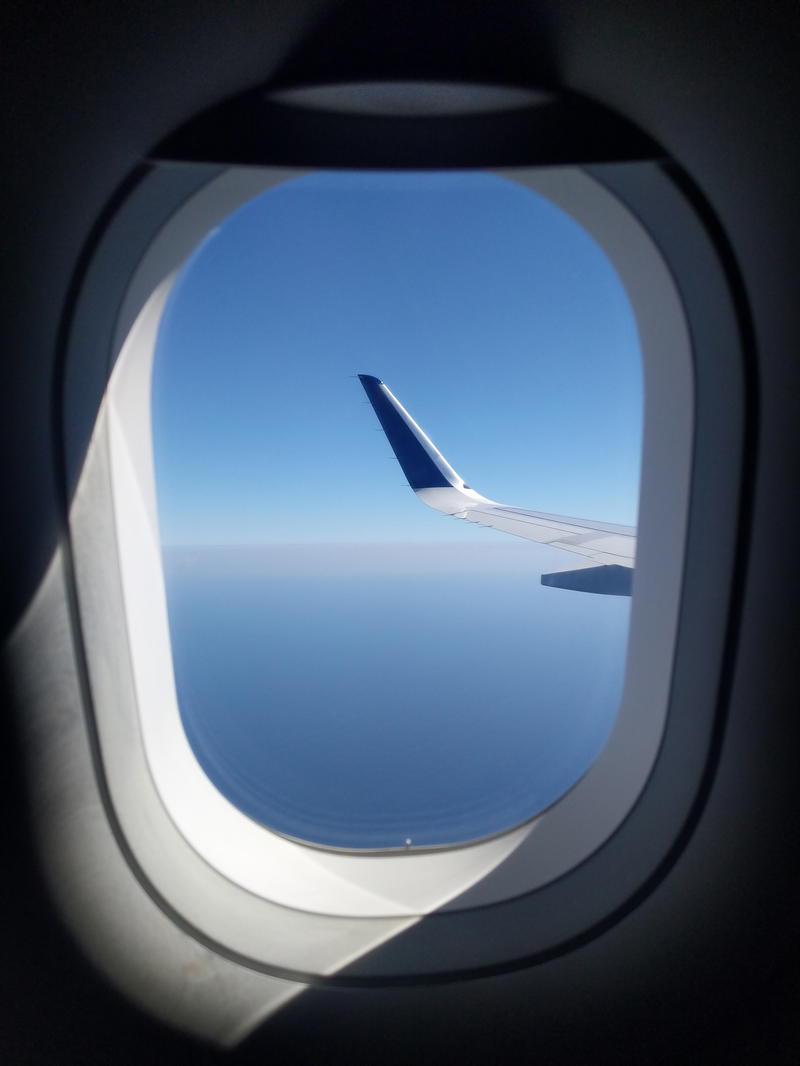
Lastly, consider taking a red eye flight . The prices on these flights tend to be cheaper because flying overnight isn’t as ideal as a morning or afternoon flight.
Keep in mind that when you arrive in your destination, you’ll have a lot of time to explore while waiting to check in to your accommodation.
Book a ticket in basic economy to save money on flights
Another thing you can do is book a ticket in basic economy class to get a lower flight price, if you don’t mind bringing only a personal item.
Lastly, you can sign up for Going , which will send you emails with various different flight deals. If you’ve been waiting for a vacation and looking to save the most amount of money, check it out!
Book flights on Skyscanner (or other sites) on anonymous mode
Booking flights for cheap with anonymous mode removes any cookies that may have pushed the prices up. So, when you keep searching flights on Skyscanner or other sites for bookings, the computer remembers you, and slowly the prices creep up (only sometimes).
When you’re ready to book, turn shadow mode on your browser, and sometimes you’ll get lucky and the prices will be cheaper.
The tip here is to use a trustworthy VPN like this one and incognito window is pretty pro.
Save money with rental cars
Rental cars have gotten really expensive these days.
When we traveled to Los Angeles recently, we decided that we needed a car. LA is a driving city and you can’t get very far by walking.
We checked all of the traditional sites and rental car prices were really high.
Luckily, an app called Turo exists and it worked perfectly. We rented a car from an LA local and we were able to get a great deal. In fact, we paid about half of what traditional rental car places charged.
If you’re not interested in Turo, you can shop around at different Airport locations, close by cities, through credit card market places and look for deals or promotions to save even more money while renting a car.

I’ll sometimes look at rental cars near a major train line to try and find the “local price”. For example, if an airport has a train line that takes you closer to a major city, look for a rental car location a few stops past the airport.
If you can wake to rent a car from the train, than great! Even if you need to take a taxi to and from the rental car location, you may still save some money with the total cost of the car.
I’m sure you’ve heard of Lyft and Uber . Both have really taken over the world.
Instead of renting a car, you can check out using those services. If you only need a few rides during your trip, it’ll be much cheaper than paying for gas, tolls and the daily rental car rate.
Lately, I’ve found that regular yellow cabs are often cheaper than ride shares, in NYC. Check around and ask for price quotes to determine what makes the most sense for you.
Here in New York City, I have an app called Curb , which allows you to get yellow taxis. It’s also safe, which is why we talk about it so much in our NYC safety guide.

Before leaving for the airport one time, we did this and it cost half as much as what Lyft and Uber were charging.
You can get $5 off of your first ride with Curb! Download the app and use the code 32S31M .
Travel in a group and share download links for free credit
While traveling in a group, try being the first one to latch on to any apps that would be useful. This could be local food delivery apps or local ride share programs.
If you get these apps first, and then share your download links with the group, you can clock yourself up lots of free credit for bringing in new members!
This tip really works because you can be trying new things and being adventurous while also getting freebies from apps.
The more you share, the more referral credit you get, and you can also learn by talking to other travelers and expats about the most efficient apps for ordering food or for ride-sharing in a particular city.
Shop around for the best hotel, Airbnb and hostel prices
Before we go somewhere or while we’re traveling and looking for an additional place to stay , we shop around to try and find the best rates.
Sometimes we’ll check Airbnb and see what prices look like. We’ll head over to Hostelworld and see if we have any luck. Maybe we’ll search on Booking.com.
Consider that if you’re traveling with a group of friends, couples or family members, that you can save money by booking an entire multi-bedroom Airbnb house or property like this one in Upstate NY , which will typically beat the cost of everyone getting individual hotel rooms elsewhere.

Before you know it, we’ve seen listings from too many sites and it’s hard to remember where we say some of the listings that we liked.
Because we’ve been staying in hotels more recently, we like to check out HotelTonight . We’ve seen some of the best prices on this website over anything else.
The only thing with HotelTonight is you can’t book too far in advance.
We’ve been having good luck on Priceline and Kayak for hotels.
Take out a weekly budget in cash
Weekly spending budgets are a huge way of seeing if you’re on track to avoid overspending during your travels.
In some countries where cash is king and credit is not so available quiet yet (or may never be), visually seeing how much cash you have left can show you how much you’ve spent.
Find creative and new ways to work remotely and travel
Traveling doesn’t have to be expensive. Have you considered working remotely while traveling in order to make some money to pay for your expenses?
You find some types of remote work to work on while you’re away, by checking these remote work tips for travelers .
If you are a professional looking for freelance work, Flexjobs can work out nicely for finding remote work and part-time opportunities.
What we also really like is traveling with a group and getting everything under the Remote Year platform like coworking membership, housing and flights onward, all for a flat fee.
Sign up for Remote Year to join the experience!

You may also like

19 Exciting Solo Travel Destinations in 2024 (From Real Travelers)
What are the best ideas for unique solo travel destinations? Check out these popular cities and countries for traveling on your own — some may surprise you.

21 Tips for Staying in a Hotel with a Baby (Experienced Parents)
How do you survive staying in a hotel room with a baby? From my experience, I list the top tips and tricks for sharing a hotel room with an infant on a vacation.
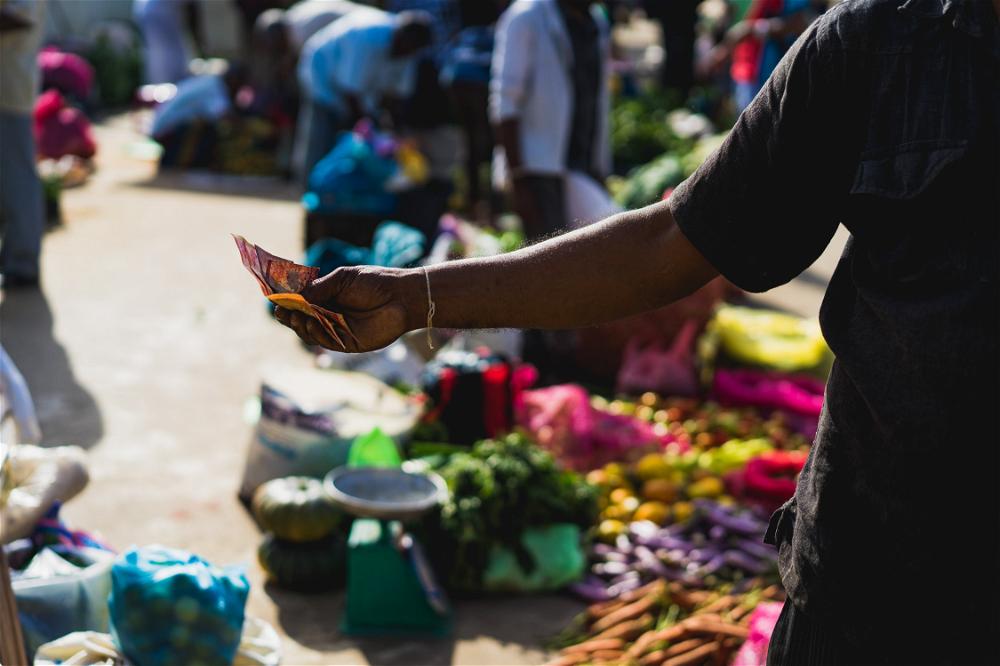
Helpful Money Tips for International Travel
We cover how to bring and spend money when traveling internationally, if you should exchange money before leaving for a trip and the best way to exchange money when abroad.
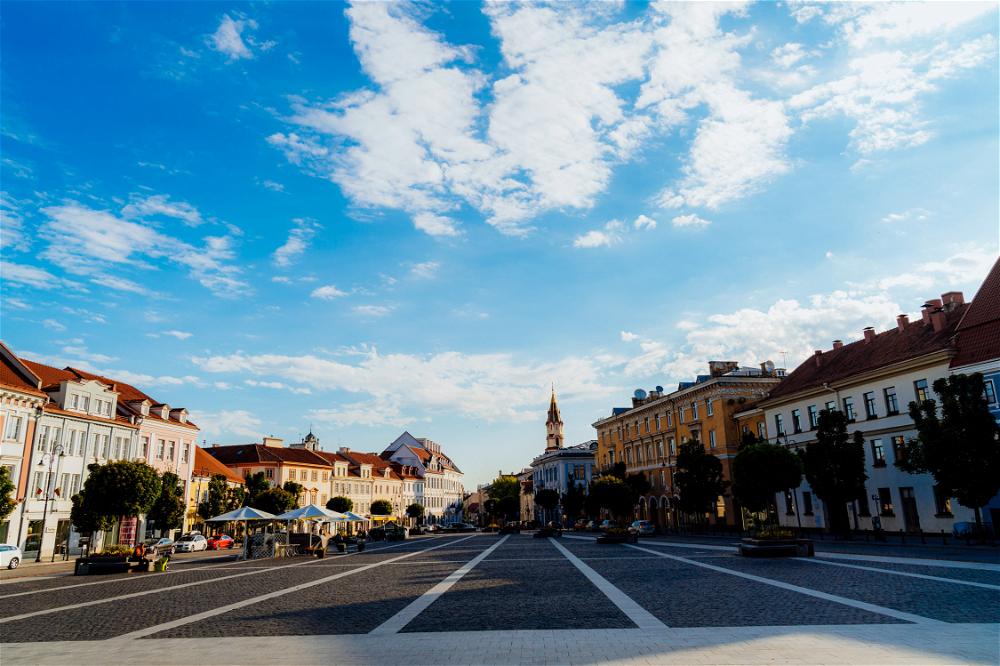
32 Safest Cities for First-Time Travelers
What are the best safe cities and safe destinations for first-time travelers? If you're traveling on your own for the first time, check out this list of easy safe cities to travel to.
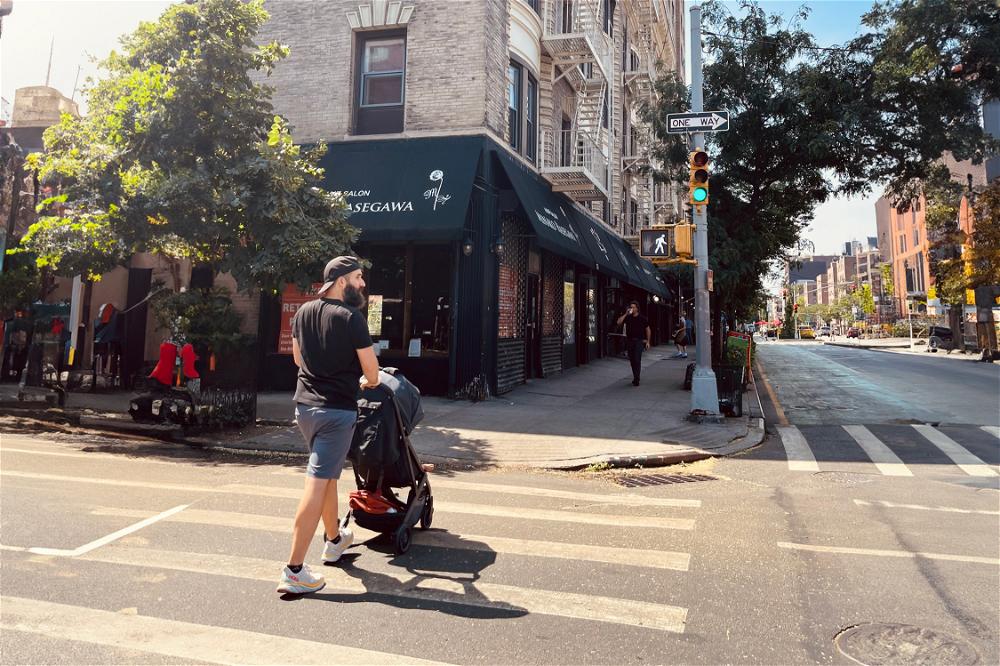
How to Plan a Trip to NYC with a Baby (What to Know)
Going to NYC with a baby for the first time doesn’t have to be hard! In our list of local tips, find out what to do and see with your baby in New York City to make the visit easy.

Google Fi for Long-Term Travel: Will It Work for Me?
For traveling long-term, is Google Fi the best option for a phone plan? See why Google Fi is our choice for international cell service, calls, texts, data and tethering, in this guide.

Nǐ hǎo ! We’re Becca & Dan.
We created this blog to share some of the knowledge and experience that we have around travel , remote work , photography and beyond!
We're currently testing out packing cubes.
Join the club
You’ll get emails with our latest articles, tips, advice and so much more! You won't find this content anywhere else!
This website may contain affiliate links. We earn a small commissions when you purchase via those links — and it's free for you. It's only us (Becca & Dan) working on this website, so we value your support! Read our privacy policy and learn more about us .
Among other programs, Half Half Travel is a participant in the Amazon Services LLC Associates Program, an affiliate advertising program designed to provide a means for us to earn fees by linking to Amazon.com and affiliated sites.

How To Create A Solo Travel Budget (Free Calculator Included!)
This post contains affiliate links to trusted partners. If you purchase through these links, I earn a commission at no extra cost to you. Thank you!
By Jessie Festa & Dale P. This guide to creating a travel budget contains affiliate links to trusted partners!
Wondering how to create a solo travel budget ? Need some help understanding how to save money on travel and manage your trip expenses?
Then you’re in the right place!
For many people, the idea of traveling somewhere new is exciting. I mean, who wouldn’t love to be regularly flying off to new destinations?
The problem: travel can be extremely expensive; luckily, there are ways to set a travel budget and explore the world on the cheap while still having a memorable experience.
In this guide, we’ll lay out step by step how to create a budget for solo travel and stick with it. Additionally, we’ll share savvy tips for saving money on travel expenses like flights, hotels, tours, and more.
Quick tip: Flights are often the most expensive aspect of your trip. Luckily, there are platforms that can help you easily find flight deals and error fares like Going (formerly Scott’s Cheat Flights) and FareDrop . In terms of accommodation, search Hostelworld for hostels (many of which have private rooms), consider housesitting through Trusted Housesitter s , book a rental with a kitchen to save money on food through VRBO , or stay on free couches through Couchsurfing . And when it comes to car rentals, Discover Cars can help you quickly compare your options and save up to 70%! These are just a few of the many ways to save money on travel. Keep reading for more!
Table of Contents
Free Travel Budget Calculator
And that’s not all! To help you set and stick with your solo travel budget, I’ve created a handy dandy Free Travel Budget Calculator .
Enter your intended trip budget at the top and then your expenses in the following rows. The calculator will tally up your expenses and let you know if you’re over or under your budget – and by how much. You’ll also get a pie chart visually showing you where you’re spending the most money.
Note: if there is a category where you’re spending is $0, please put “0” in the line field. Otherwise, you may receive an error.
- If there is a category where you’re spending $0, please put “0” in the line field. Otherwise, you may receive an error.
- This calculator looks at your per day, per person costs (unless otherwise noted). If you’d prefer to calculate by the total costs for each category, click here .
- If you’d prefer to just calculate the trip costs for yourself, enter “1” for the Number of Travelers.
- Want more travel calculators? You can grab my full suite of trip planning calculators – plus other goodies – in my free Travel Resource Library !
Travel Budget Calculator
On that note, let's discuss how to set a solo travel budget and stick with it.
Is Solo Travel Expensive?
Solo travel doesn't have to be expensive. There are pros and cons when it comes to traveling solo and how it relates to your budget.
When you travel solo, you have complete control over your itinerary, which can help you save money. You can stay wherever you want, eat wherever you want, and do as many or as few tours and activities as you'd like.
How much you spend is totally in your control. This is one of the biggest benefits of solo travel .
However, there are some areas where you may end up spending more as a solo traveler. For example, you won't have anyone else to split the cost of hotels or taxis with. This is why it's crucial to understand how to set a solo travel budget and also save money on travel.
Considerations When Setting A Solo Travel Budget
Before you start to set a solo travel budget, there are several important factors to consider.
Determine available funds
Before you can plan your travel budget, you will need to determine the funds you actually have available for this trip. It's possible to travel solo to most destinations around the world - even notoriously pricy ones - as long as you're prepared and realistic.
If you don't have enough funds for your trip yet, determine the amount you'll spend and then set a timeline for saving money to achieve your goal.
You can use a website like BudgetYourTrip to get an idea of travel costs in destinations around the world.
Set realistic budget goals
Building off of the step above, you'll need to set realistic budget goals if you want to end up successfully sticking to your travel budget.
When setting budget goals, think about your own personal interests and travel style.
Are you a huge foodie who doesn't care as much about museums and tours? Is staying in a luxurious hotel room your top priority? Whatever the case is, you'll want to pinpoint your priorities and budget accordingly.
Budget categories
Dividing your travel expenses into categories can help you effectively budget for a trip. The main categories you'll want to budget for include:
- Transportation
- Travel Insurance
- Miscellaneous
You might want to build in a 10% buffer to your total travel budget to account for miscellaneous costs. It can also be a good idea to set aside some money for emergency expenditures. This will help you stay prepared and travel solo successfully .
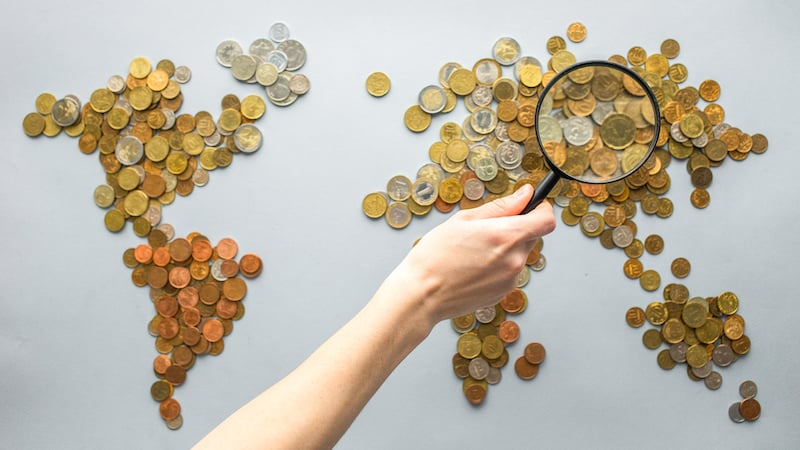
How To Set A Solo Travel Budget
Are you ready to learn how to plan a travel budget? Here are seven simple steps to follow to budget solo travel effectively.
1. Plan your itinerary. In order to successfully budget for your trip, you'll want to plan your itinerary first so you can accurately budget your expenses. For short trips of a week or two, it should be easier to get specific. For long-term trips like a multi-month backpacking trip, you may have to plan more broadly.
2. Identify transportation costs. How much will your flights cost? How much will transportation on your trip cost? Will you be taking additional flights, trains, buses, boats, taxis, or public transportation? This should all be factored into your travel budget.
3. Estimate food costs. Food is another key part of your solo travel budget and one that is fairly consistent. Set a reasonable daily spending limit for food. You may decide to eat one meal out per day and cook the rest of your meals at your accommodation. Additionally, opting for street food meals can be a smart way to save money. Whatever you choose, work it into your budget.
4. Identify activity costs. If you're taking a short trip, you may plan to pre-book tours and activities. If so, be sure to add these to your budget. For longer trips, you might allot yourself a certain amount for activities and tours each day or each week.
5. Don't forget travel insurance. If you can't afford travel insurance, you can't afford to travel. Just check out these travel horror stories to see why it's so important. Covering your trip is more affordable than you might expect. Two of the best travel insurance providers are SafetyWing and World Nomads .
6. Add a buffer. After you've calculated your total travel budget, add a buffer for miscellaneous expenses. If your total budget is $1,500, you may want to add an additional $150 for spontaneous expenses that might crop up and another $150 as an "emergency fund" for your trip.
7. Commit to keeping yourself accountable. Finally, commit to checking in with your budget during your trip. It only takes a few minutes a day to track your expenses and make sure your expenditures are in line with what you planned for. You can use an app like Trabee Pocket to help with this.
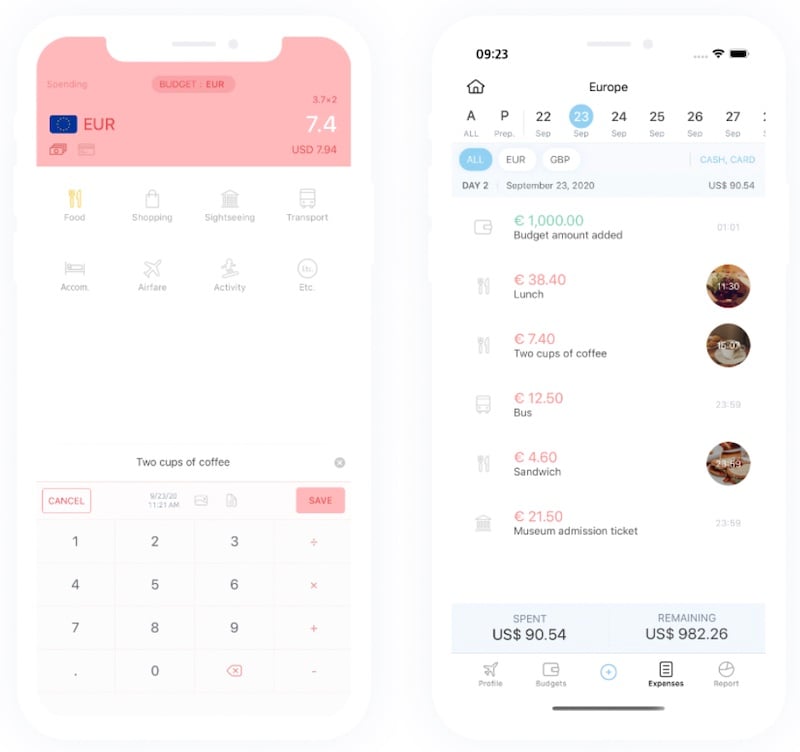
Tips For Managing Travel Expenses
Planning your travel budget is one thing, but actually sticking to it is an entirely different matter!
Fortunately, there are travel budgeting tools you can use to track your travel expenses and ensure you are sticking to the travel budget you set.
Use a travel budgeting app
There are a number of ways you can manage your travel expenses. You can use a simple spreadsheet or a general budgeting app like Mint or You Need A Budget .
There are also (free!) travel budgeting apps like Trabee Pocket , Tripcoin , and TravelSpend that allow you to track your travel expenses across various categories.
Make budgeting a priority
You don't need to fixate on your budget the entire time you're traveling, but take a few minutes at the end of every day to tally your expenses and make sure you're on track.
Many travelers don't do this, which can lead to major overspending and regrets.
Choose the right payment methods
Before your trip, do some research on which payment methods you'll use. Some destinations are still very cash-dependent while others have gone almost totally cashless.
If you'll need cash, make sure you have an ATM card with no fees. For Americans, Charles Schwab's Investor Checking bank account allows you to withdraw money from any ATM in the world with no fees. Basically, any fees that are charged are reimbursed to you at the end of the month.
For credit cards and debit cards, you'll want to make sure your cards have no foreign transaction fees. While certain cards will have an annual fee - though this often comes with lots of travel perks - there are also credit cards that are $0 per year, like the SavorOne Rewards card from Capital One .
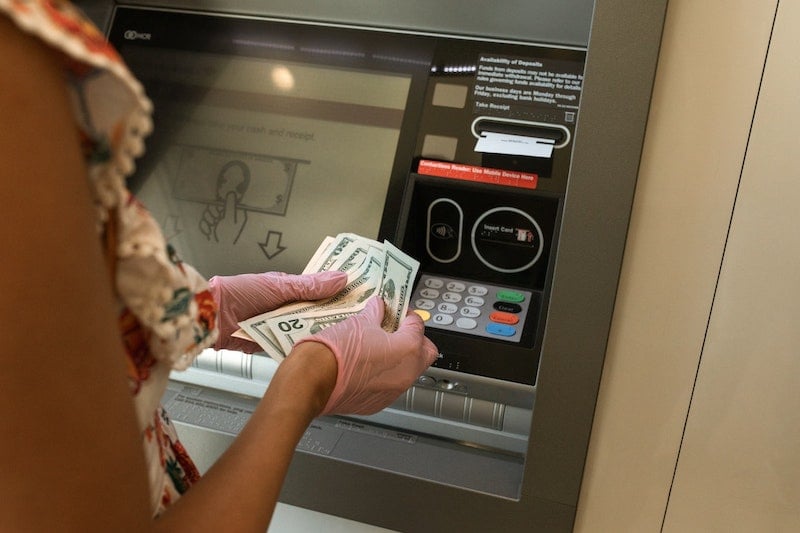
Choosing A Destination That Fits Your Travel Budget
If you're on a tight budget, choosing the right destination can help you stretch your money further. You can get more for your money in destinations like Southeast Asia, Eastern Europe, and Central America than you can in Western Europe, North America, or Oceania.
Other factors to consider when choosing a destination include:
Seasonality
Traveling in the off-season is a great way to save money on your trip. Prices for everything - accommodation, transportation, and tours - are generally lower outside of the peak tourist season. Plus, as an added bonus, you can enjoy many destinations with much lower crowds.
There are some tradeoffs to traveling during the off-season. For example, it might line up with the rainy season or colder weather; but for many travelers, it's worth it for the savings.
You can also travel in "shoulder season," the month or two before or after the high season. This usually gives you the best of both worlds: good weather but lower prices and lower crowds.
Type of trip
Do you want to city-hop across European capitals, explore jungles, volcanoes, and ancient ruins in Central America, or explore beaches and rice paddies in Southeast Asia?
Depending on the type of solo vacation you want to take, this can factor into where you go and how you budget for your one-person vacation accordingly.
Budget-friendly destinations
Here are some of the best destinations worldwide for cheap vacations to take alone where your dollar will stretch further:
- Southeast Asia: Indonesia , Thailand, Cambodia, Laos, Malaysia , Philippines, Vietnam
- Europe: Portugal , Romania, Poland, Czech Republic, Albania, Montenegro
- Latin America: Mexico , Guatemala, Nicaragua, Colombia, Ecuador, Peru
This is by no means an all-inclusive list, but it gives you an idea of countries where you can have inexpensive solo vacations for as little as $50 a day - or less, if you take the following money-saving tips to heart.

How To Save Money On Flights
Flights can be one of the biggest expenses for any solo trip, especially if you are traveling internationally. Here are some ways to take inexpensive solo trips by saving money on flights.
Travel during the off-season
Traveling during the off-season is a great way to save money on all aspects of your trip, especially airfare. For example, flights to Europe from the U.S. may be as much as 50% lower during the months of October and November compared to the peak summer months of June through August.
Be flexible with your travel dates
If you can be flexible with your travel dates, you can score some great deals on airfare. Leaving or returning a day or two earlier or later may result in massive fare differences.
Of course, sometimes this means traveling at strange times (like leaving mid-week instead of at the start of a weekend) but if you can afford to be flexible, it can pay off massively.
In terms of how to tell which days are the cheapest for travel, Google Flights has a visual calendar with prices showing for each day.
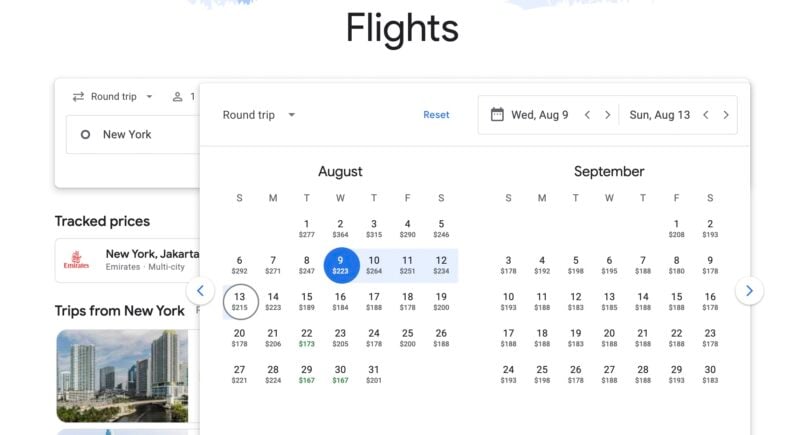
Set fare alerts
Can't be flexible with your travel dates? Set a fare alert on Google Flights and be notified when airfare drops for your specific dates. This can help you score seriously cheap flights.
It's a good idea to set a fare alert well ahead of time and keep in mind that the "sweet spot" for booking a domestic flight is 60 days in advance and 120 days in advance for an international flight.
Get notified about deals & error fares
If you want to find the absolute cheapest airfare possible and find error fare deals , there are a few tools you can use.
The first is Twitter . You can set alerts to receive Tweets from fare deal accounts like @TheFlightDeal and @SecretFlying.
There are also services like Going (formerly Scott's Cheat Flights) and FareDrop that send deals and error fares right to your inbox to help you save hundreds of dollars on flights.
For the above strategies, just make sure to book your flight right away, as typically the deals showcased change quickly. You might even make finding a great flight deal your method for choosing your destination!

How To Save Money On Accommodation
Your solo travel costs can skyrocket quickly depending on where you stay. Luckily, there are several ways to save money on solo travel accommodation.
Stay in hostels
One of the best ways to save money on accommodation for single travelers is by staying in hostels. Staying in a hotel can get very expensive if you don't have anyone to share the cost with.
Hostels are an affordable alternative for inexpensive solo travel. And if you think that hostels are only for young people or for backpackers on an extreme budget, think again!
Many hostels cater to travelers of all ages. There are also tons of hostels that resemble boutique hotels more than your typical hostel, and many have private rooms that are comparable to hotel rooms.
Of course, for travelers on a tight budget, staying in a shared hostel dorm room is one of the best ways to save money on your accommodation costs.
You can search a site like Hostelworld to compare the hostel options in your preferred destination. Once you search by location, date, and number of travelers, you'll be given a list of properties and will be able to see right away the rate as well as if private rooms are available.
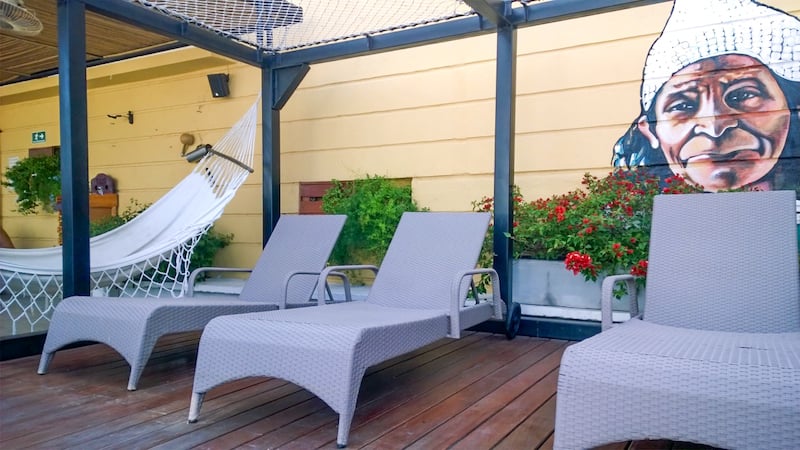
Use travel credits & points
If you prefer to stay in hotels, using travel credit cards and redeeming points can be a great way to save money or even get a totally free hotel stay.
Many hotel chains like Marriott and Hilton offer co-branded credit cards with sign-up bonuses that can be earned after spending a certain amount of money within a few months of opening the card. These points bonuses can typically be redeemed for several free hotel nights.
You can also use a general travel rewards credit card, like the Chase Sapphire Preferred Card , which offers similar sign-up bonuses in points that can be redeemed towards hotel stays and other travel. Just note that this card does have an annual fee, though it also comes with many travel perks.
Try housesitting or couchsurfing
If you're looking for a way to travel very cheaply and spend zero dollars on accommodation costs, housesitting and couchsurfing are two unconventional methods of travel to consider.
Housesitting involves staying in someone else's home and taking care of their pets and house while they are away. You may be responsible for feeding, walking, and playing with pets, watering the plants, keeping the house tidy, and generally taking care of the place while the owners are away.
Trusted Housesitter s is the best platform for finding housesitting jobs. It's a great way to live like a local in a new destination and save money on accommodation.

Another option is couchsurfing. The official Couchsurfing website will help you connect with locals who offer free accommodation to travelers around the world.
As the name suggests, you might be sleeping on someone's couch, so it's not the most glamorous way to travel. But it's great for budget travelers who want to connect with locals.
Important solo travel safety tip : solo female travelers should be especially careful when couchsurfing. It can be a good idea to only stay with female hosts or to vet potential hosts by making sure they have positive reviews from other couch surfers first.
Speaking of safety, you might also consider packing a few travel safety essentials - like a She’s Birdie Personal Safety Alarm , which is TSA-approved and can help scare away potential attackers. Other recommendations include Clever Travel Companion Pickpocket-Proof Garments and Speakeasy Travel Supply Hidden Pocket Scarves .
How To Save Money On Food While Traveling Solo
Food is an area of your budget that can get eaten up quickly (no pun intended) while traveling if you aren't careful. Here are some ways to save on food while traveling solo without sacrificing the fun of eating out and discovering new cuisines:
Go grocery shopping
One of the best hacks for inexpensive solo travel is grocery shopping and cooking meals on your own while you travel. Most hostels offer communal kitchens, or you can be sure to choose an Airbnb , VRBO , or other rental that includes a kitchen.
You don't have to cook every meal on your own, but even just cooking for yourself a few times on your vacation instead of eating out can save you a lot of money.
Choose accommodation with free breakfast
Many hostels and budget hotels offer free breakfast every morning, which can be a great way to save money on one meal per day.
Before booking your accommodation, check to see which places offer free breakfast. You can fill up on a complimentary buffet breakfast in the morning, and then you'll only have to spend money on lunch and dinner.
Eat where locals eat
Finally, eating where locals eat is one of the best ways to save money on food while you travel. Restaurants that cater to tourists are often overpriced and don't even serve the best food.
However, if you get off the main tourist trail and seek out the spots where locals eat, you'll most likely find much better prices — and much better food.
Do some research before you travel to find the best local eats in the destinations you're visiting, or better yet, ask a local for recommendations once you arrive.

How To Save Money On Activities While Traveling Solo
Many activities, such as visiting museums and tourist attractions, will not cost you anything extra as a solo traveler. However, some activities do run the risk of incurring the dreaded "single supplement."
Here are some tips for cheap solo travel activities:
Research free activities
Free activities are one of the best strategies for how to travel solo on a budget. You'd be surprised at how many free things to do there are in most destinations.
For example, in New York City, there are dozens of free viewpoints you can visit rather than paying $50+ to go to an expensive observation deck.
Moreover, activities like solo beach days and solo hikes are almost always free.
Consider purchasing a city pass
Many popular destinations around the world, particularly major cities with lots of tourist attractions, offer city passes.
These passes give you access to many popular museums, attractions, and experiences for a discounted price compared to buying entry to each activity individually. They can also help make solo travel more fun by introducing you to a destination's top attractions.
If you're someone who enjoys visiting many museums and tourist attractions, this can be an excellent way to save money on activities. You can check the official CityPASS website to see if your destination is listed, though keep in mind there are other brands of discount passes too.
Avoid solo travel supplements
Unfortunately, some activities carry a single supplement for solo travelers. For example, cruises and tours that are priced based on double occupancy often carry a supplement for solo travelers.
When it comes to group tours, you can often agree to share a twin room with another traveler to avoid having to pay for a single supplement.
On cruises, you can sometimes find solo travel deals where the single supplement is waived or greatly reduced.

How To Save Money On Transport While Traveling Solo
When it comes to how to travel solo for cheap, managing your transportation costs is another important element for sticking to your solo travel budget.
One of the drawbacks of traveling solo is that you don't have anyone to split transportation costs with. When traveling with others, you can save money by splitting a taxi, Uber, or rental car.
But on your own, here are some ways to save money:
Use public transportation
Public transportation is one of the best ways to save money while traveling solo. Taking a taxi or an Uber all the time can quickly get pricy, but public transportation typically costs a couple of dollars or less per ride.
If you'll be staying in a destination for an extended amount of time (more than a few days) and plan to use public transportation frequently, it may also be worth purchasing a weekly transit pass compared to buying single tickets.
Research transportation in advance
Another way to save money on transport is to come prepared to your destination. Research the best ways to get around in advance of your trip.
In some places, renting a car may actually work out to be a cheaper option, while in other places, you might save money using rideshare services, buses, or trains.
Stay in a central location
Staying in a central location is a great way to save money on transportation in your destination. You may find a hostel that's $10 cheaper outside the city center, but what if you have to spend $10 a day on transportation costs to get where you want to go?
Choosing a central location means that you'll be able to walk around more and spend less money on transport costs. You may also want to choose accommodation that's close to the train station or public transportation in your destination.

Where To Get Travel Insurance
Before heading off on a solo trip, it's wise to get travel insurance.
One of the best travel medical insurance for travelers is SafetyWing as they’ve got a large network and offer both short-term and long-term coverage — including coverage if you’re traveling for months as well as limited coverage in your home country.
Additionally, SafetyWing is budget-friendly and offers $250,000 worth of coverage with just one low overall deductible of $250.
Click here to price out travel insurance for your trip in just a few clicks .
Post-Travel Budget Review
After your trip, it's a smart idea to do a post-travel budget review. Find an hour to sit down and closely review how much you spent during your travels.
Take a look at your initial budget and your actual expenditures and see how well you stuck to what you planned to spend. Were there any areas where you went over budget?
Maybe you spent way more money than you expected on going out to eat, or maybe you ended up splurging on Ubers or taxis more often than you took public transportation.
Identify these areas of improvement for future travel planning purposes, but don't get down on yourself too much for a little bit of overspending. Money will come and go, but the memories from your travels will last a lifetime, and that is priceless!
Planning A Solo Trip On A Budget: Final Thoughts
Hopefully, these tips can help you confidently travel the world solo on a budget! While travel can certainly be expensive, it's also possible to book travel at a reasonable price.
It's helpful to look at the biggest costs to determine how you can get them down, like traveling outside of peak season, such as during shoulder season, and making use of strategies to keep big ticket items like flights and hotels low.
Using the steps above, you'll be able to create a travel budget for your solo vacation - and stick with it!
What would you add to this guide on how to create a solo travel budget?
Enjoyed this post on creating a travel budget? Pin it for later!
Related posts:
About Dale P.
Dale is a native New Yorker and an NYC-based travel writer and blogger. She loves sharing insider tips about New York City travel and other destinations with others.

Hi, I’m Jessie on a journey!
I'm a conscious solo traveler on a mission to take you beyond the guidebook to inspire you to live your best life through travel. Come join me!
Want to live your best life through travel?
Subscribe for FREE access to my library of fun blogging worksheets and learn how to get paid to travel more!

Turn Your Travel Blog Into A Profitable Business
Subscribe to my email list to snag instant access to my library of workbooks, checklists, tutorials and other resources to help you earn more money -- and have more fun -- blogging. Oh, and it's totally FREE! :) // Privacy Policy .
Check your inbox for your welcome email + resource library password!
Great tips on solo travel budgeting! The breakdown of costs and advice on how to save is super helpful. I especially liked the suggestions for finding affordable accommodations and local dining options. Thanks for sharing these practical strategies. Zetexa can offer perfect travel support in terms of connectivity.
Leave a Comment Cancel Reply
Americans are turning to new ways to cut expenses right now
- Despite easing inflation, many Americans are still looking for ways to save money.
- The high cost of homeownership and smaller pay bumps are among the factors weighing on consumers.
- Travel, car insurance , clothes, and home improvement are areas where people have trimmed spending.

Inflation may be coming down , but Americans are still looking for ways to save money.
Over the past year, many US consumers have spent less on travel, clothes, home improvement , and car insurance, according to surveys, business executives, and analyses of Americans' spending patterns.
For some people, this means seeking out lower-priced clothing, travel destinations , DIY projects, and car-insurance policies. But for others, it's meant delaying or foregoing spending altogether.
This shift is yet another example of how Americans have changed their consumption habits in recent years, in part to combat various economic challenges.
In 2022, US consumers spent a larger share of their disposable income on food than they had in over 30 years, according to data from the US Department of Agriculture. And many people looked for creative ways to spend less at the grocery store , a Numerator poll and a Food Industry Association survey found .
While price growth for food and other expenses have slowed considerably over the past two years, dwindling COVID-era savings , smaller pay bumps at work, and the still high costs of homeownership , childcare , and retirement have continued to motivate consumers to save money.
"People are going to spend, but they're only going to spend when they feel like there's really value there," Ted Rossman, a senior industry analyst at Bankrate, previously told Business Insider .
But where consumers choose to spend their money — and not spend it — is ever-changing.
In 2022, despite rising prices across the economy, many Americans decided that shelling out on experiences and trips was worth it as pandemic restrictions eased. However, in recent months, several travel-industry companies have pointed to " softness " in Americans' travel demand, particularly among lower-income consumers.
To be sure, Americans — particularly high-income people — are still spending at strong levels overall. Additionally, there are some expenses, like groceries , where shoppers continue to look for ways to get around elevated prices.
However, travel, clothes, home improvement, and car insurance are among the areas where many Americans have cut back more over the past year to give their finances a boost.
Here's how this spending shift is playing out.
While plenty of Americans have taken vacations in recent years , there's evidence that the travel industry is in a bit of a slowdown.
A Deloitte survey of more than 4,000 Americans conducted in March and April found that the average traveler planned to take 2.3 trips during the summer months, down from 3.1 in 2023. Additionally, a Bank of America analysis published in May found that average travel spending per US household had fallen by 1.5% over the prior year.
During their second-quarter earnings releases, several travel-industry companies — including Airbnb, Hyatt, Marriott, Wyndham, Expedia, and Hilton — said they expected travel demand to weaken in the coming months, CNBC reported in August.
However, not all Americans have cut back on their travel spending — there's evidence that wealthier consumers have continued to splurge . The travel slowdown appears to have been driven by lower-income Americans.
"They've spent all that money. They're now borrowing more," Hilton CEO Chris Nassetta said on an August earnings call about lower-income consumers. "And so they have less available disposable income and capacity to do anything, including travel."
In August, Disney reported a "moderation of consumer demand" at its theme parks.
"The lower-income consumer is feeling a little bit of stress," Hugh Johnston, the CFO of Disney, said in August.
Financial pressures have led many Americans to shop for discounted clothing , a Bank of America analysis published in August found.
The share of Americans who purchased most of their clothes in the "value" tier — rather than "standard" or "premium" — has increased in each of the past two years to about 30% as of July, Bank of America data showed.
The report said that Gen Zers and millennials were among the demographic groups that had shifted more toward value apparel over the past year.
"Gen Z and millennials are spending more on necessities as they grow older and take on more financial obligations, leaving less for discretionary items," the report said. "And younger generations are still favoring discretionary experiences like travel and restaurants, which leaves even less of their budget for discretionary goods like apparel."
Car Insurance
Over the past year, the cost of car insurance has risen by 16.5% , according to the Bureau of Labor Statistics. Only eggs and frozen noncarbonated juices and drinks have had a bigger year-over-year increase, according to the bureau. Car-insurance rates are near the highest they've been in decades.
The elevated costs of car insurance have led more US drivers to go without it, The Wall Journal reported in July, citing the Insurance Research Council. The share of uninsured drivers rose from about 11% in 2019 to 14% in 2022, according to the latest available data from the council .
Initial data suggested that the share of uninsured drivers rose further in 2023, an Insurance Research Council spokesperson told USA Today. Additionally, survey data from the auto-industry research firm J.D. Power indicated that this trend persisted during the first half of this year.
While driving without insurance is illegal in almost every US state , some people told the Journal they were taking the gamble to help themselves afford groceries, housing, healthcare, and other expenses.
Ditching car insurance isn't the only way drivers have tried to reduce their insurance costs. In a J.D. Power survey of more than 10,000 US car-insurance customers between March 2023 and January, 49% of respondents said they had actively looked for a new policy over the prior year. Among those who'd looked, 29% said they had switched insurance carriers.
"After the past few years of steady auto insurance premium increases, customers are no longer passively keeping an eye out for a better deal," Stephen Crewdson, the senior director of insurance-business intelligence at J.D. Power, said in a release published in April. "Instead, they are actively seeking new carriers to offset these rising costs."
Home-improvement projects
Some Americans also appear to be holding off on home-improvement or do-it-yourself projects to save money.
Lowe's same-store sales, a measure of sales at the company's stores that have been open for at least a year, fell by over 5% in the second quarter compared with the same period in the prior year, and the company said it expected its same-store revenues to decline by as much as 4% overall in 2024.
"We're all aware that we have an environment of elevated interest rates and inflation, and because of that, the DIY customer is just on the sidelines waiting for some form of an inflection to take place," Marvin Ellison, the CEO of Lowe's, said on the company's second-quarter earnings call.
Meanwhile, Home Depot said it expected its full-year same-store sales to decline by as much as 4% in 2024.
"It's simply a story of a deferral mindset among our customers who have the means to spend," Richard McPhail, Home Depot's chief financial officer, told Bloomberg in August.
In addition to the inflation of the past few years, elevated interest rates could be making some homeowners less likely to borrow money or rack up credit-card debt to finance their home upgrades.
Have you found creative ways to save money? Are you willing to share your story? If so, reach out to this reporter at [email protected] .
- Main content

Select your preferred language
- Deutsch English English (Australia) English (China) English (India)
- English (United Kingdom) Español (Latinoamérica) Español (España) Français Italiano
- Português (Brasil) Suomi Svenska 中文
The 10 best ways to save money on business travel

Finding business travel savings might sound like a challenge – especially with anticipated travel price increases, as detailed in our 2024 Global Travel Forecast . But there are ways to keep your costs down without compromising on traveler safety or services.
With a smart process in place, you can save money on every trip – and make both your travelers and your stakeholders happy. Check out 10 of the most effective ways to reduce your overall business travel spend.
- Tighten up your business travel policy From booking flights to meal allowances and handling expenses, there’s a lot to consider when setting out a business travel policy. Take a close look at your existing business travel policy and consider whether it’s robust enough to cover every area of travel spend within your company. Focus first on getting the fundamentals in order – a proper approval process, along with guidelines on bookings and reservations, on-site spending and expenses. Setting clear procedures will help your business travelers make decisions that stay within your policy and don’t incur additional costs that hurt your bottom line. If you don’t have a travel policy in place, read our handy guide on how to write one .
- Have a pre-trip approval process One of the simplest ways to reduce your business travel spend is by having an approval system in place for every booking. By making it clear who needs to approve travel, you won’t have the problem of trips having to be canceled after they’ve been booked, triggering wasted expenditure. If you partner with a travel management company, make full use of their online booking tool , which often includes trip approval processes. This should give you better oversight when it comes to setting up travel arrangements. CWT’s tool allows you to choose which employees can book their own hotels and flights and easily monitor their bookings. It means you can take immediate action if they venture outside your travel policy.
- Save on airline flights Airline tickets can be expensive, so be smart about which ones your employees’ book. Employees could save just by being flexible on the dates of travel and airline they use, and by booking economy flights only. However, once booked, having a fixed travel plan is usually cheaper. Encourage traveling employees to only buy flexible tickets that provide an option of return dates, if absolutely necessary for the trip. Getting alerts for airfare promotions and discounted rates can also massively reduce your business travel costs. For example, CWT’s innovative travel management software searches for the best prices and the most competitive rates on airfares. Our additional price optimization tool uses artificial intelligence (AI) to automatically cancel and rebook tickets when it finds a cheaper deal to the same location, saving you even more money. On average, our customers can save USD 150 per ticket.
- Cut the cost of hotels Room rates can vary enormously, even within the same hotel, so being smart can deliver big savings. You may decide you want to let your business travelers choose where they want to stay. That’s fine – just make sure you set a budget threshold or star rating. You might also want to specify that standard rooms should be the required room type, and clearly outline whether you’ll be covering minibar charges, Wi-Fi costs and so on. If you want to stay in control of the booking, research will also pay off. Our hotel offering on our easy-to-use booking tool, myCWT , provides genuine, independent peer reviews from business travelers who have stayed in those hotels. If your employees visit the same location regularly, we can help you negotiate special discounts on hotel rates. Available for hotel fares as well, you can also watch savings mount with our price optimization tool , which will cancel and rebook accommodations automatically when prices drop. On average, our customers save USD 100 per stay.
- Consider bleisure travel Combined leisure and business trips allow for more flexibility when it comes to timing, which helps bring travel prices down. There’s also more openness to blended travel from senior management. According to a Future Market Insights (FMI) global report, bleisure travel already accounts for 33% of all business travel. This follows a cultural shift from the strains of the pandemic, but also how travel intersects with well-being, employee retention and recruitment, especially for younger employees.
- Explore trip batching Embrace the shift towards sustainability and lower costs through a strategy called trip batching. Rather than travelers booking individual trips, trip batching involves choosing a region and booking multiple trips in the area at once. Since the pandemic, there’s been a 10% increase in such multi-destination trips. Consolidation of trips can lead to reduced emissions, cost savings, and more efficient use of your employees’ travel time.
- Understand ancillary charges Additional charges such as Wi-Fi and parking easily add up to give you an unpleasant surprise at the end of a trip – especially when you thought everything had been accounted for. Some business service providers can bundle these costs into one combined package, helping you factor them into your budget forecasts and keeping you in control of your spend.
- Help your employees be more productive on the road If your employees are spending less time organizing their trip, they’re spending more time working – which is good for your company. Making their journey run as smoothly as possible at every stage will help them stay productive during their trip. Software can play a big part in this – for example, our complimentary myCWT app syncs employees’ travel schedules with their business smartphone calendars, giving them important travel details whenever needed. Additionally, employees stay in the know with trip and safety alerts, destination intelligence and real-time flight status updates supporting the broader objective of enhancing employee productivity and safety throughout their travels.
- Partner for travel optimization Hiring a business travel specialist can rein in your overall business travel spend. As experts in the field, we work with global organizations to implement customized travel management programs and services – and our industry-leading travel support can save you money, time and stress. By teaming up with a travel management company like ours you can benefit from preferential rates on airfares and hotels, as well as on-site offers and promotions. Plus, our best-in-class business intelligence and reporting solution combines data from trip expenses such as airfares and non-trip expenses such as business meals. It gives you full visibility of all your travel arrangements, helping you make the right decisions that will lead to significant reductions in your costs.
- Reward your employees – and your business Every time your employees pick a more cost-effective travel option, they save the company money. Over the course of a year, that can really add up. So, how about giving them an incentive to deliver further savings? It could be a voucher for their favorite store, a share of the savings, or time off – just some way of thanking employees for reducing your travel costs and encouraging them to keep doing it. There are also savings to be had by ensuring your business makes the most of business reward schemes. These cost nothing to join and give your company points every time you make a booking. Once your points have built up, they can be redeemed against the cost of airline tickets, upgrades, and often hotels and car rental.
More publications
Contact us today to see just what we could do for your business
Learn more about our travel management offering.
Travelers: manage your travel here . The below form is for inquiries about our corporate travel management offering.
To reach out to CWT to learn more and also receive communications (email or phone) on our products and services, please complete the form below. You can unsubscribe at any point in the future from our mailing list using the ‘unsubscribe’ link on any of our emails.
Thank you for your interest in CWT, we will contact you soon.
Thank you for your interest in CWT. Unfortunately, CWT cannot offer services in your home country at this time. Your contact request has not been submitted.
With kind regards,
Advertiser Disclosure
Many of the credit card offers that appear on this site are from credit card companies from which we receive financial compensation. This compensation may impact how and where products appear on this site (including, for example, the order in which they appear). However, the credit card information that we publish has been written and evaluated by experts who know these products inside out. We only recommend products we either use ourselves or endorse. This site does not include all credit card companies or all available credit card offers that are on the market. See our advertising policy here where we list advertisers that we work with, and how we make money. You can also review our credit card rating methodology .
Medical Tourism Is Having Its Moment. Here’s What To Know and How To Use Travel Rewards To Save More.
Brett Holzhauer
Content Contributor
69 Published Articles
Countries Visited: 22 U.S. States Visited: 29
Michael Y. Park
27 Published Articles 346 Edited Articles
Countries Visited: 60+ U.S. States Visited: 50
Jestan Mendame
Compliance Associate
118 Edited Articles
Countries Visited: 12 U.S. States Visited: 3

Table of Contents
The pros of medical tourism, the cons of medical tourism, what to know before traveling for medical reasons, top destinations for medical tourism, how to use points and miles to save, final thoughts.
We may be compensated when you click on product links, such as credit cards, from one or more of our advertising partners. Terms apply to the offers below. See our Advertising Policy for more about our partners, how we make money, and our rating methodology. Opinions and recommendations are ours alone.
Traveling somewhere to save money isn’t a new concept. Many people from my home state of Florida travel to the Bahamas for luxury goods like watches and jewelry to avoid sales taxes. Instead of a Rolex or Gucci purse, millions of Americans are heading to the airport for more affordable (and sometimes better) medical care, known as medical tourism .
A July 2024 TikTok post has gone viral with a young woman from Idaho flying to Istanbul, Türkiye, for a full body checkup, including scans, tests, and consultations. ¹ The hook of medical tourism for people like her is the combination of the quality of the care compared to what you would receive in the U.S., along with an astonishingly low price. The video has garnered over 16 million views and sent the term “medical tourism” soaring on Google Trends.
It’s trendy but not new. The practice of traveling goes back to the ancient Greeks, who developed medical centers that people traveled far distances to visit. People suffering from illness made the trek to healing temples, or asklepieia. Fast-forward to modern times, and medical tourism is as popular as ever. According to Statista, it’s expected to drive $47 billion in 2024 and grow to $111 billion by 2029. ²
Here are the pros and cons of taking your medical procedures outside the U.S., what you need to know before doing so, and how to save on travel costs by using points and miles.
The largest benefit of traveling outside the U.S. is the potential savings. In 2022, the average American spent over $13,000 in health care costs, according to the Centers for Medicare & Medicaid Services .
It’s hard to estimate the cost of American health care, as much of it is predicated on the patient’s health insurance coverage and the provider. Outside of the U.S., it can be much more transparent but still varies by the provider. So, like any other purchase, you’re advised to do your research to find the best deal and provider for your needs.
Here are a few examples of medical and cosmetic procedures and the potential savings of traveling outside of the U.S.:
A few weeks ago, the Today Show aired a story about medical tourism, highlighting a couple trying to have a baby. The Pasinis were shocked by the price inside the U.S., so they looked elsewhere. The husband is Italian and found it was much cheaper to travel to Italy for their IVF treatments.
So, as you research your options, be sure to check to see how much you could potentially save compared to receiving care at home.
Better Care
Despite Americans spending trillions of dollars annually on health care, our health care system historically doesn’t rank well compared to other countries . Price can be a leading factor, but quality is also notable.
A 2020 research paper in the Journal of the American Pharmacists Association studied a group of over 400 Americans heading south of the border for medical care and found that “[m]ost survey respondents felt that Mexican health care services are of the same or better quality compared with those in the U.S., for a lower cost, and plan to participate in medical tourism moving forward.”
Social media is abundant with videos showing outstanding facilities and level of care, making U.S. facilities look largely inferior.

Language Barriers
Doing anything medical can evoke anxiety for some, especially being in a foreign country. On top of that, the local language and culture can add an extra barrier between you and the medical professional trying to help you.
In the viral TikTok video we first mentioned, the woman going to Istanbul had a translator and guide throughout her entire medical checkup. So if you’re not somewhat fluent in the local language, it could be helpful to inquire about translator services at the provider or even hire a local translator for the day.
Travel Costs Can Outweigh Benefit
The costs of traveling to and from can obviously eat into the savings of the medical procedure itself. But if you prefer the glass-half-full view, you can at least get a trip out of it.
Like anything else, be sure to weigh all of the costs involved to see if medical tourism is the right option for you.
Traveling for a medical procedure, whether cosmetic or medical, can be intimidating. Here are a few steps to follow to start your research.
First, look at online reviews and accreditations of the hospital and provider. Each country has different medical standards, which can make the selection process tricky. As you’re searching, look to see if the provider is accredited by the Joint Commission International . Founded in 1997, the organization sets medical standards in over 70 countries to ensure the highest quality of care. You can find the countries and organizations that have the accreditation here .
Second, consider using a third party to help find you the services you need. FlyMedi in Türkiye is one of many agencies helping consumers find the right medical attention for their needs outside their home country.
Third, consult your medical insurance agency about your policy and coverage to see if it would cover any medical costs outside of the U.S. While it’s unlikely, the agency may have additional resources for you. They would likely rather see you go overseas rather than make a claim anyway.
While saving money is almost always a good idea, medical care isn’t an advisable place to pinch pennies. From 2009 to 2022, 93 Americans died from cosmetic surgery in the Dominican Republic, according to the Centers for Disease Control (CDC) . The typical complications are infection-related , but you can mitigate this risk by doing your research before selecting a provider.
Lastly, you’re advised to consult with your primary care physician in the U.S. before heading out. The CDC recommends meeting with your doctor 4 to 6 weeks before to ensure you have the proper vaccinations, immunizations, and medications beforehand.
The latest edition of the Patients Beyond Borders book “ Everybody’s Guide to Affordable, World-Class Medical Travel ” may be worth a read for your research.
Some countries have become known as hubs for specific procedures. Türkiye is known for its affordable hair transplants, Egypt for its affordable cosmetic surgeries, and Greece has options for fertility treatments. Türkiye has even garnered nicknames for the medical tourists it attracts, including “Turkey Teeth,” referring to people flying there for cosmetic dental work like crowns and veneers.
There is no single best country for all things medical, but according to Global Healthcare Accreditation , a Florida-based accrediting organiz ation geared toward medical travel, here are popular countries for medical tourism:
- Costa Rica : About 13.4% of tourists coming to Costa Rica annually do so for medical purposes. (Nearly 2.5 million people visited the country in 2023.)
- India : The country’s medical tourism market is estimated to be worth $9 billion and is projected to grow to $13 billion by 2026.
- Malaysia : In 2023, over 1 million people traveled to Malaysia for medical treatment.
- Mexico : An estimated 1.4 to 3 million people visited Mexico for medical purposes in 2020.
- Taiwan : The medical tourism market is worth $64 billion .
- Thailand : The medical tourism market in Thailand is expected to grow to $16 billion by the end of 2030.
- Türkiye : In 2023, 1.8 million people visited for medical treatment.
- Singapore : Over 500,000 people visit Singapore for treatment each year.
- South Korea : Over 600,000 people visited South Korea in 2023 for treatment.
- United Arab Emirates : Medical tourists spent $270 million for treatment in 2022.
Pick a Provider, Airline, and Card Simultaneously
The key to using rewards to their fullest extent is to reverse-engineer the process. This means creating a plan of where you want to go, which airline will get you there, and what rewards you will need.
For example, let’s say the provider you select for your medical procedure is in Singapore, and you want to fly Singapore Airlines to get there. From there, you could sign up for a card with transferable rewards to Singapore Airlines KrisFlyer , like the Chase Sapphire Preferred ® Card or the American Express ® Gold Card .
Additionally, before signing up for 1 or more cards, design a plan for meeting the minimum spending requirements. You’re never advised to spend more to earn miles, so do your best to earn welcome bonus offers with purchases you were already planning on making.
Consider signing up for a new card and paying for your medical-related costs on that card. These costs can help you earn the welcome bonus.
Comfortable, Long-Term Accommodation Is Essential
Earn hotel points ahead of time.
Traveling for a medical procedure could involve downtime, so leaning into a hotel credit card could be beneficial.
Some medical procedures could make you sensitive to flying, so be sure to consult with your doctor on the appropriate rest time before flying back home. But in some countries, your hotel points may go further, so be sure to look into each hotel brand to see if there’s a property where you could enjoy an extended stay after the operation.
Here are a few cards and their welcome bonuses that could come in handy:
*The information regarding the Hilton Honors American Express Aspire Card was independently collected by Upgraded Points and not provided nor reviewed by the issuer.
Consider an Airbnb or Other Long-Term Stay
If you’re planning on more intensive surgery, an Airbnb or other long-term accommodation may be a better route to go. And, yes, there are ways to earn and redeem miles for an Airbnb stay .
If your Airbnb booking is expensive, consider purchasing discounted Airbnb gift cards. Retailers like Costco and Sam’s Club occasionally offer gift cards at less than retail value. Make sure to use one of our recommended credit cards for buying gift cards .
Medical tourism can be great for those who are open to shopping around for medical services that may not be covered under their current medical insurance. As with any trip, plenty of research should go into it to make sure you find the right provider and cost to make it worth it.
Additionally, be sure to take care of the essentials to make your trip seamless. Things like applying for Global Entry , ensuring your passport is up to date , signing up for a credit card with no foreign transaction fees , and protecting yourself with travel insurance can help you avoid significant headaches along the way.
All information and content provided by Upgraded Points is intended as general information and for educational purposes only, and should not be interpreted as medical advice or legal advice. For more information, see our Medical & Legal Disclaimers .
The information regarding the Hilton Honors American Express Aspire Card was independently collected by Upgraded Points and not provided nor reviewed by the issuer.
For rates and fees of the American Express ® Gold Card, click here . For rates and fees of the Marriott Bonvoy Brilliant ® American Express ® card, click here .
UP's Bonus Valuation
This bonus value is an estimated valuation calculated by UP after analyzing redemption options, transfer partners, award availability and how much UP would pay to buy these points.
Press Release
Go big or go comfy: spirit airlines to offer unmatched value with new travel options and transformed guest experience.
Low-fare travel leader changes the game again with the announcement of new premium offerings starting August 2024
DANIA BEACH, Fla. , July 30, 2024 /PRNewswire/ -- Spirit Airlines (NYSE: SAVE) is redefining low-fare travel with new, high-value options that empower travelers to choose an elevated Guest experience at an affordable price. The airline is introducing new offerings, including brand-new premium selections, as part of a significant transformation that delivers an even friendlier, more comfortable, and cost-effective travel experience. Spirit will begin offering new travel options for booking on Aug. 16 and launch the newly transformed Guest experience by August 27, 2024.

"We're unveiling a new era in Spirit's history and taking low-fare travel to new heights with enhanced options that are unlike anything we've offered before," said Ted Christie, Spirit's President and Chief Executive Officer. "We listened to our Guests and are excited to deliver what they want: choices for an elevated experience that are affordable and provide unparalleled value."
New Travel Options, All with Exceptional Value In a milestone moment for low-fare travel, Spirit will offer its Guests the option to select a premium experience at an unmatched price. The new premium experience will complement additional options ranging from elevated to economical to meet the needs of all travelers. The four new travel options include: Go Big, Go Comfy, Go Savvy and Go. All four options include the flexibility of no change or cancel fees.
- Go Big delivers the best value in the sky and includes a Big Front Seat®, snacks and drinks, including alcoholic beverages, one carry-on bag, one checked bag, priority check-in and boarding, and streaming access through the fastest Wi-Fi of any U.S.-based airline.* The Big Front Seat features enhanced comfort with wider seats, extra legroom, additional seat cushioning and no middle seat. Go Big will be available to book and experience starting Aug. 16, with snacks and drinks included and priority check-in launching on Aug. 27.
- Go Comfy is a brand-new seating option that offers increased comfort and space with a guaranteed blocked middle seat, one carry-on bag, one checked bag, priority boarding, and a snack and non-alcoholic beverage. Go Comfy will be available to book starting Aug. 16 and experience beginning Aug. 27.
- Go Savvy provides the choice of either one carry-on bag or one checked bag and standard seat selection during booking. Go Savvy will be available to book and experience starting Aug. 16.
- Go offers the greatest affordability for those who want to keep it simple with the flexibility to purchase any of the following options: checked bags, standard seat selection, Wi-Fi, and snacks and beverages. Go will be available to book and experience beginning Aug. 16.
Designated Priority Check-In Spirit will debut a priority check-in experience on Aug. 27 for Guests who opt to Go Big or are Free Spirit ® Gold members or Free Spirit World Elite Mastercard holders at more than 20 airports including Atlanta (ATL), Cancun (CUN), Dallas-Fort Worth (DFW), Detroit (DTW), Fort Lauderdale (FLL), Houston (IAH), Las Vegas (LAS), Los Angeles (LAX), Newark (EWR), New York-LaGuardia (LGA) and Orlando (MCO). This dedicated lane will provide front-of-the-line access to the first available ticket counter agent for Guests to breeze through check-in.
Enhanced Boarding Experience Guests will benefit from a more seamless journey with Spirit's new boarding process starting Aug. 27. The redesigned process will include five groups that aim to reduce boarding time and enhance operational performance. Priority boarding will be available for Guests who choose the Go Big and Go Comfy options, Free Spirit Gold and Silver members, Free Spirit World Elite Mastercard holders and active-duty U.S. service members, and their spouses and children when traveling with the service member.
Expanding Guest-Friendly Policies Spirit previously announced exciting new Guest benefits that add value and provide industry-leading flexibility:
- No change or cancellation fees for all Guests
- Increased checked bag weight allowance up to 50 pounds
- Extended Future Travel Vouchers expiration to 12 months (for vouchers issued on or after June 3, 2024)
View the new travel options in more detail at spirit.com/s/info .
*The fastest of any U.S. based airline, based on publicly available data
About Spirit Airlines Spirit Airlines (NYSE: SAVE) is a leading low-fare carrier committed to delivering the best value in the sky by offering an enhanced travel experience with flexible, affordable options. Spirit serves destinations throughout the United States, Latin America and the Caribbean with its Fit Fleet®, one of the youngest and most fuel-efficient fleets in the U.S. Spirit is committed to inspiring positive change in the communities it serves through the Spirit Charitable Foundation . Discover elevated travel options with exceptional value at spirit.com .
SOURCE Spirit Airlines, Inc.
- Credit cards
- View all credit cards
- Banking guide
- Loans guide
- Insurance guide
- Personal finance
- View all personal finance
- Small business
- Small business guide
- View all taxes
You’re our first priority. Every time.
We believe everyone should be able to make financial decisions with confidence. And while our site doesn’t feature every company or financial product available on the market, we’re proud that the guidance we offer, the information we provide and the tools we create are objective, independent, straightforward — and free.
So how do we make money? Our partners compensate us. This may influence which products we review and write about (and where those products appear on the site), but it in no way affects our recommendations or advice, which are grounded in thousands of hours of research. Our partners cannot pay us to guarantee favorable reviews of their products or services. Here is a list of our partners .
How to Save Money on Hotels

Many, or all, of the products featured on this page are from our advertising partners who compensate us when you take certain actions on our website or click to take an action on their website. However, this does not influence our evaluations. Our opinions are our own. Here is a list of our partners and here's how we make money .
Frequent travelers have their routines set. They know how to maximize their elite status perks and how to save money on hotels in the process. Still, there are some tricks of the trade that may not be so familiar to everyone.
Here are eight ways to save money on hotels, whether you're staying for one night or several.
1. Become a loyalty program member
Loyalty programs are about more than just racking up miles and points to redeem later. Sure, those are amazing benefits. The experience snowballs to even more perks when you earn elite status. But, there’s another reason why you should join a loyalty program even if you don’t travel much: discounts on hotel stays. In an effort to encourage people to book directly, hotel programs offer a discount to members when they book through their own channels. You can save quite a bit of money this way.
Popular hotel chains and their rewards programs include:
Best Western: Best Western Rewards .
Choice Hotels: Choice Privileges Rewards .
Hilton: Hilton Honors .
Hyatt: World of Hyatt .
IHG: IHG One Rewards .
Marriott: Marriott Bonvoy .
Wyndham: Wyndham Rewards .
Other discount programs include AAA and AARP, which can slash the cost of a stay. These, however, carry a fee to join, whereas hotel loyalty programs are free.
» Learn more: How to choose the best hotel loyalty program for you
2. Save with best rate guarantees
Since hotel companies want you to book directly with them, most offer a best rate guarantee program. This assures that you will find the lowest rate on their own website. When booking hotel stays via an online travel agency , like Booking.com or Orbitz.com, hotels have to pay a commission. Encouraging direct bookings helps to avoid that.

If you find the same room at your hotel on the same dates for a lower rate elsewhere, hotel companies will often offer a reward of some sort. This can include a percentage back as a refund or bonus points. Knowing about best rate guarantees can help save some cash, especially when searching for hotels in pricey destinations like Miami or New York.
» Learn more: How to find and book a hotel
3. Spend strategically on hotel credit cards
Depending on which hotel brand you frequent most often, signing up for a hotel-affiliated credit card can deliver substantial savings for upcoming stays. Not only will you earn bonus points for using the card to cover the room rate, but it may come with elite status perks that can cut down on costs during your visit. For example, the Hilton Honors American Express Aspire Card offers top-tier Diamond status in Hilton’s loyalty program, and the IHG One Rewards Premier Credit Card comes with Platinum Elite status in IHG's loyalty program.
Things like breakfast, club lounge access, late checkout and even welcome amenities like fruit plates and drinks can come in handy. You won’t have to pay for these perks during your stay, which helps you save.
» Learn more: A beginner's guide to hotel elite status
4. Take full advantage of onsite benefits
Like elite status perks, except available for everyone, some hotels offer free breakfast , evening happy hours and other benefits. Many brands like Embassy Suites by Hilton and Staybridge Suites make these extra perks part of their value proposition. If you’re traveling with the family and looking for the best Disney hotels , why fork over extra cash for breakfast each morning if some hotels offer it free of charge?
Embassy Suites has complimentary cooked-to-order breakfast that amounts to big savings for a family. All rooms at Embassy Suites are suites with a separate bedroom and living area. Why pay for a suite upgrade elsewhere when that’s the standard at this brand? Understanding what each brand within a hotel chain’s portfolio offers can lead to substantial savings.
» Learn more: Tips for booking big hotel rooms for families
5. Get bonus points by booking via cash-back portals
The more expensive your stay (pricier rooms or longer visits), the more valuable this one will be. Using cash-back portals to make online purchases is a great way to save some cash as you can 'double dip' your award earnings. All that's required is that you visit a shopping portal website, like Rakuten.com or TopCashBack.com, and click on the online retailer or hotel website you want to book.
While not all hotel chains participate, many do. You'll earn a percentage back of what you spend in your account, which then comes back to you in the form of a check or gift cards. Airlines and hotel companies also have their own shopping portals if you prefer to receive those benefits as miles or points.
» Learn more: Use 'virtual malls' to rack up airline points on your next hotel stay
6. Roll the dice with prepaid room rates
This one is for the daring traveler. Prepaid rates are usually nonrefundable and can shave a nice chunk off the cost of a hotel stay. What you save in money though, you lose in flexibility. If your plans change at the last minute, you won’t be able to get your money back without Cancel for Any Reason travel insurance . Still, this can be a solid way to lower the cost of a hotel stay if you are certain that you plan to spend the night.
Several Las Vegas hotels and other high-end resorts may charge a daily 'resort fee' that gets tacked onto the room rate. These are often not included in a prepaid rate.
» Learn more: The best Las Vegas hotels without resort fees
7. Strike up a deal
If you plan to visit a hotel often or for an extended period of time, give the hotel’s sales department a call. Chances are they might offer you a discount for booking directly. Hotels often offer these deals for group bookings, and if you'll be staying a significant number of nights over the course of the year, they may want to secure your business. Of course, this will vary by city and property, but it’s always worth a try.
8. Optimize for low-cost options by booking with OTAs
If you don’t care about singular hotel loyalty , earning points or taking advantage of elite status perks, some websites and apps like Hotel Tonight or Priceline offer bargain deals at the last minute. This is a great way for a hotel to dump excess inventory in the market without jeopardizing their reputation. These deals are opaque, which means you don’t know the exact hotel until you pay for it. You can save money this way, but you may not always get the best room in the house.
» Learn more: The pros and cons of joining multiple hotel programs
Savings and discounts for hotel rooms, recapped
What will you do with the extra cash you save on hotels? Savvy travelers will put these money-saving tips to good use the next time they book a hotel.
Consider the tradeoffs of booking the cheapest rates versus not earning loyalty points. If status or earning free night stays is not that important, you can use the money you save for something more personally valuable at your destination.
The next time you make a hotel reservation, see if any of these pointers can put some extra cash in your wallet.
How to maximize your rewards
You want a travel credit card that prioritizes what’s important to you. Here are some of the best travel credit cards of 2024 :
Flexibility, point transfers and a large bonus: Chase Sapphire Preferred® Card
No annual fee: Wells Fargo Autograph℠ Card
Flat-rate travel rewards: Capital One Venture Rewards Credit Card
Bonus travel rewards and high-end perks: Chase Sapphire Reserve®
Luxury perks: The Platinum Card® from American Express
Business travelers: Ink Business Preferred® Credit Card
On a similar note...


IMAGES
COMMENTS
Take advantage of credit card free night certificates. 8. Book hotel rooms on points. 9. Travel during the offseason or shoulder season. 10. Explore tourist attractions that don't cost you any ...
A long term travel calculation might look like this: My trip will cost: $30,000. Each month I can save: $500. 30,000 ÷ 500 = 60, which divided by 12 is 5. So if I need to save up $30,000 and I'm able to set aside $500 each month, it will take me 60 months/5 years to save up for my trip.
31. Compare ferry to flying. While ferry transport conjures up romantic images of the wind in your hair and the sun setting over the ocean, ferries can eat up a lot of time, and often they don't save you much money. It could be cheaper and much faster to fly to your island destination.
Double win! 9. Get a new credit card. A travel credit card can give you free money, free rooms, and free flights. After accruing miles and rewards points with your card on everyday purchases, you can redeem them for free travel on your trip. Travel credit cards are a big weapon in a budget traveler's arsenal.
2. Use points and miles. Award travel is one of the easiest ways to save money on flights. Using airline miles or credit card points to travel can score you discounted plane tickets, even in first ...
12 Unconventional Ways to Save on Travel. Points and miles are major, but there are other cheap ways to travel too. Consider setting up airfare alerts, housesitting and traveling midweek to help ...
5. Catch public transportation everywhere you go. Skip the taxi and rideshare options when you can—these fees really add up, especially if you plan on hitting multiple places in one day for several days. Buses, metro, trains, and rail cars are all great ways to save money, with each ride costing about $1-2. 6.
2. Plan ahead. "One of the best ways to save money on travel is by planning and booking your trip well in advance," said Nadia Podrabinek, founder of Why This Place, a travel advice company ...
How to Budget for a Trip. Plan ahead, save up, and make the most of credit card rewards. By Carissa Rawson. Updated on December 31, 2021. Reviewed by. Khadija Khartit. In This Article. Plan for the Big Expenses. Account for the Little Costs of Traveling.
Packing light means you can be more flexible with travel plans and easily move from one location to another. 10. Look for free walking tours. Exploring a city's secrets doesn't have to cost a fortune. Free walking tours offer a wallet-friendly way to learn about the history and culture of a new place.
Some credit cards offer generous sign-up bonuses too. "If a bonus is worth at least US$200, it's a good card," says Choi. "You may also consider a credit card that doesn't charge the standard 2.5% fee when buying abroad. It may not sound like a lot but 2.5% certainly adds up over time.". Business-leisure travelers can save by ...
One of the easiest ways to save money on travel is to start cooking all your meals. That means breakfast, packed lunch, and dinner. Do not pick up a coffee and bagel on your way to work because that cost can quickly snowball. Restaurants are always more expensive than a home-cooked meal.
Pro-tip: This is a particularly great strategy if where you're staying has a mini-fridge." —Lori LeRoy. 9. Book hotel rooms that include breakfast in the price. "If your hotel offers free ...
11. Use The Best Booking Sites. From Daniella Flores of Hiking and Roadtrips. I love using apps like Southwest, Expedia, and VRBO to save money on travel when I don't have many points to use. Southwest is best for domestic flights, Expedia for rental cars, and Airbnb for accommodation.
But you may be able to have a luxury trip on a budget if you travel to the right places. Spots like the Maldives, New York City, St. Barths, Paris, Santorini and Hong Kong are traditionally more ...
7 ways to save money on holiday travel in 2024. 1. Use miles or points for flights. Using points or miles to book flights can help you save cash on a portion of the trip, which is a trend that ...
Travel Budget: Enter your overall vacation budget you have for this trip. Number of Nights: Enter the number of nights you will need accommodations for. This will be used to calculate hotel costs. Number of Vacation Days: Enter the number of days you will be on vacation. Include travel days to be safe.
Top strategies include booking with a budget carrier (52%), sticking to one carry-on bag (48%), using credit card points or rewards (39%) and tracking ticket prices (28%), it said. One in three ...
Many airline cards, including several of the Delta SkyMiles credit cards, $0 checked bag fees for cardholders and companions traveling on the same itinerary. In many cases that can save up to $60 ...
My cost of travel in Singapore averaged closer to $100 per day, even with staying at an American friend's apartment. Dan traveled to Iceland and the cost per day was comparable. In Singapore, street food meals cost close to $20, beers in a convenience store were $7, a taxi from the bar district to my friend's apartment was $40 and other ...
How To Save Money On Travel. One thing that makes sticking with a trip budget easier is knowing how to lessen your travel costs. A few important tips: 1. Choose your destination wisely. Calculating travel expenses typically begins with choosing your travel destination - which is one of the most important factors in your travel budget.
How To Save Money On Accommodation . Your solo travel costs can skyrocket quickly depending on where you stay. Luckily, there are several ways to save money on solo travel accommodation. Stay in hostels. One of the best ways to save money on accommodation for single travelers is by staying in hostels.
Despite easing inflation, many Americans are still looking for ways to save money. The high cost of homeownership and smaller pay bumps are among the factors weighing on consumers. Travel, car ...
On average, our customers save USD 100 per stay. Consider bleisure travel. Combined leisure and business trips allow for more flexibility when it comes to timing, which helps bring travel prices down. There's also more openness to blended travel from senior management.
Travel Costs Can Outweigh Benefit. The costs of traveling to and from can obviously eat into the savings of the medical procedure itself. But if you prefer the glass-half-full view, you can at least get a trip out of it. Like anything else, be sure to weigh all of the costs involved to see if medical tourism is the right option for you.
Spirit Airlines (NYSE: SAVE) is redefining low-fare travel with new, high-value options that empower travelers to choose an elevated Guest experience at an affordable price. The airline is introducing new offerings, including brand-new premium selections, as part of a significant transformation that delivers an even friendlier, more comfortable, and cost-effective travel experience. Spirit ...
Save money when you travel to Wanstead Park by train. Railcards offer value for money if you travel by train, saving you at least 1/3 on most rail fares. With a bit of planning, buying tickets in advance can save you a pretty pound, and if the travel bug has you travelling a lot then a Railcard might be worth your while!. The Railcards available include:
Here are eight ways to save money on hotels, whether you're staying for one night or several. 1. Become a loyalty program member. Loyalty programs are about more than just racking up miles and ...